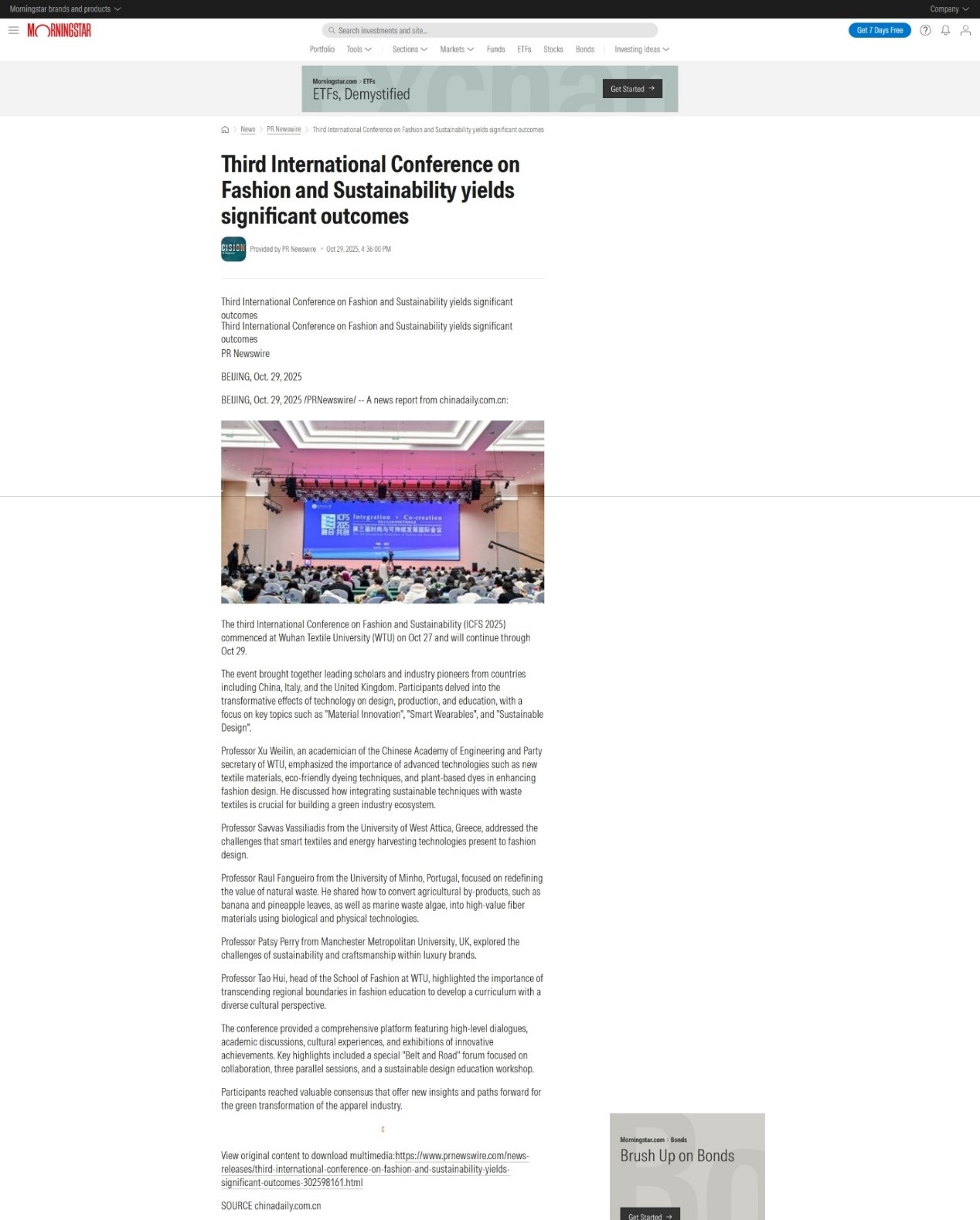On the morning of October 27, the third International Conference on Fashion and Sustainability, themed "Integration and Co-creation: Technology and Culture Driving Sustainable Fashion Development," opened at the Jianquan Auditorium of Wuhan Textile University. This international conference brought together over ten top scholars and industry pioneers from China, Italy, the United Kingdom, Japan, Greece, Bangladesh, Portugal, and other countries to explore how technology is reshaping design, production, and education.
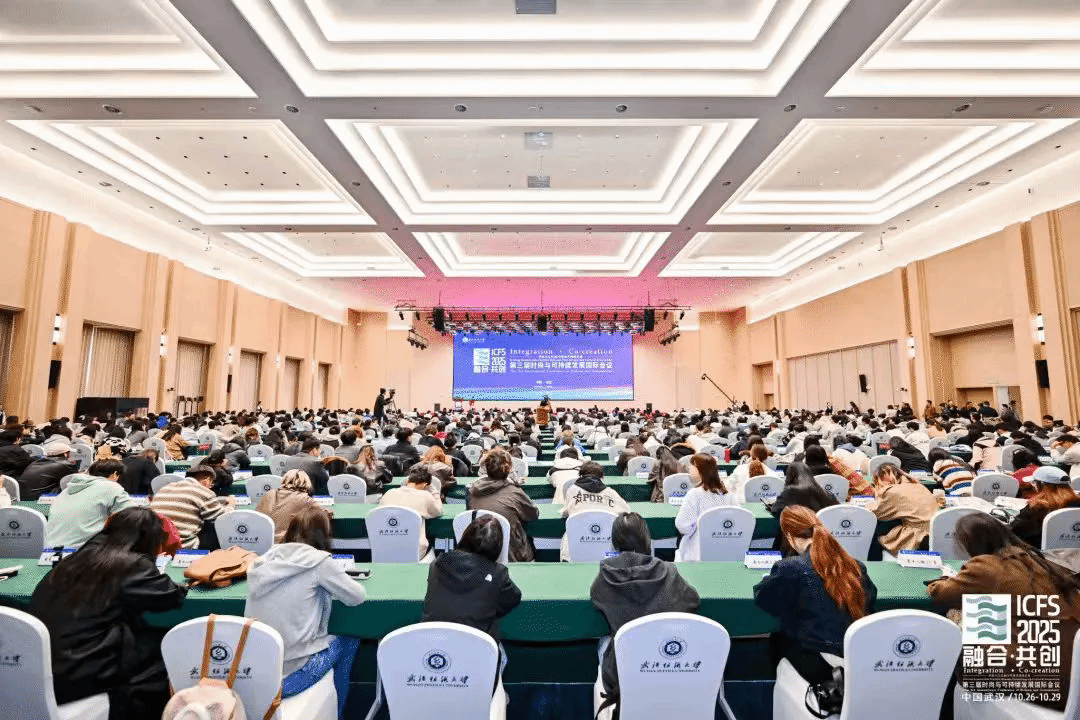
The opening ceremony and keynote forum focused on core topics such as "Material Innovation," "Smart Wearables," "Digital Twins," "Sustainable Design," and "Cross-Cultural Education," sharing cutting-edge insights and outlining a new vision for the future of fashion. Over 600 people attended the opening ceremony and keynote forum.
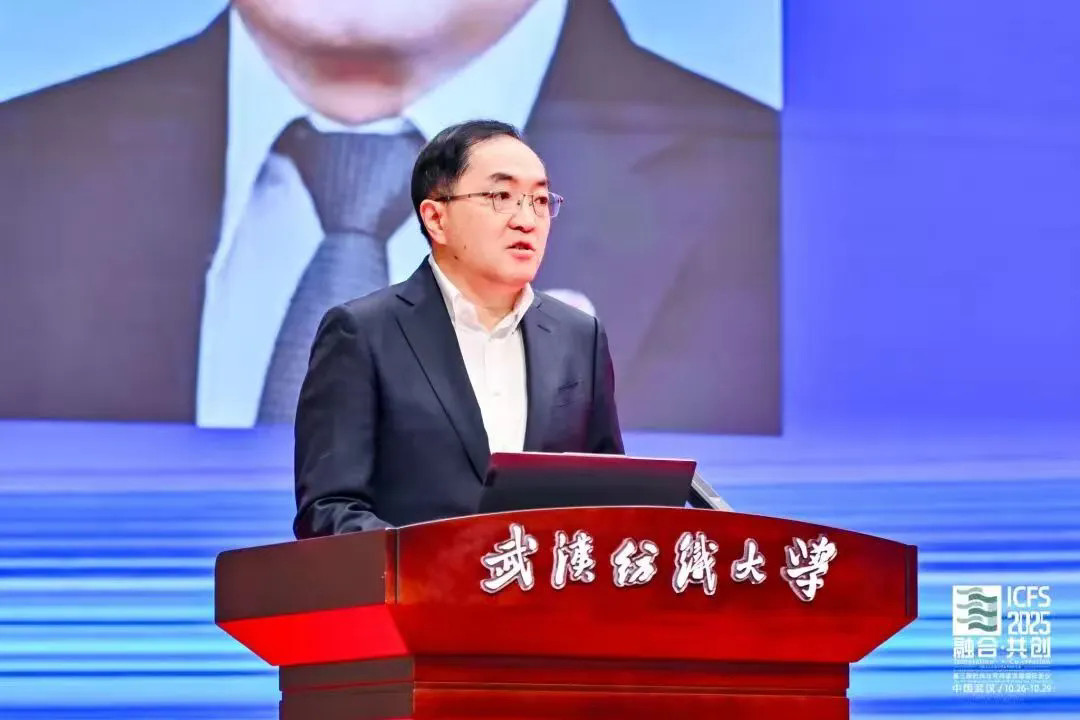
In his opening speech, Fu Xin, President of Wuhan Textile University, emphasized that promoting green and low-carbon development is a global consensus and key to high-quality development. He noted that the conference's theme accurately seizes the core of industrial transformation and will inject new wisdom into the global fashion industry. As the only university in China named after "Textile," the university adheres to distinctive development, with its textile discipline consistently ranking among the top globally. Breakthroughs have been made in technological innovations such as the lunar surface national flag and national key laboratories. The School of Fashion has deeply engaged in fields like smart wearables, cultivating high-quality new talents with remarkable results. President Fu expressed hope that the conference would serve as a high-level platform to gather global wisdom and jointly create a more sustainable future for the fashion industry.
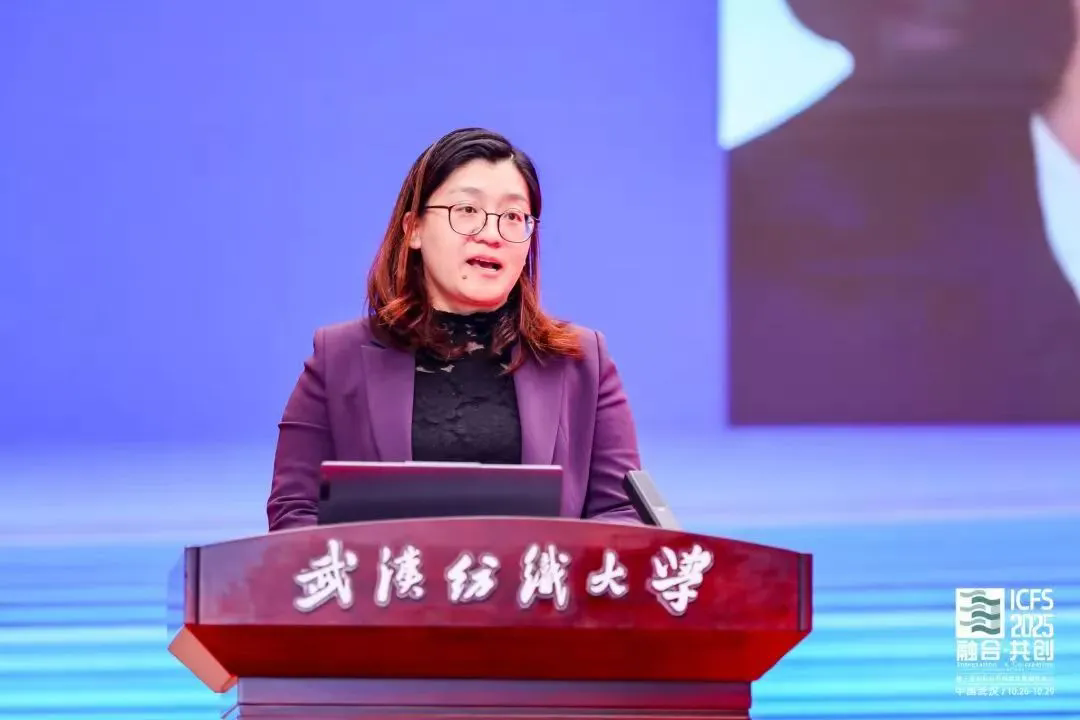
Liang Wei, Director of the International Cooperation and Exchange Office of the Department of Education of Hubei Province, delivered a speech at the opening ceremony, extending warm congratulations on the convening of the international conference. She pointed out that against the backdrop of global efforts to address climate change and resource constraints, promoting the green, intelligent, and global transformation of the fashion industry is of great significance. The conference's theme accurately responds to the needs of industrial transformation, highlighting the crucial role of technology and culture as dual drivers of sustainable development. Liang Wei emphasized that textiles and apparel are key pillar industries in Hubei, and Wuhan Textile University, as a "Double- First Class Initiative" candidate university in the province, has achieved significant results in the talents cultivation and sustainable research. The Department of Education of Hubei Province will continue to support the university in deepening industry-academia-research collaboration, strengthening discipline construction, and hopes that the conference will serve as an opportunity to build a cross-cultural collaboration platform, gather global wisdom, jointly explore innovative paths for sustainable fashion development, and inject new vitality into industrial and regional development.
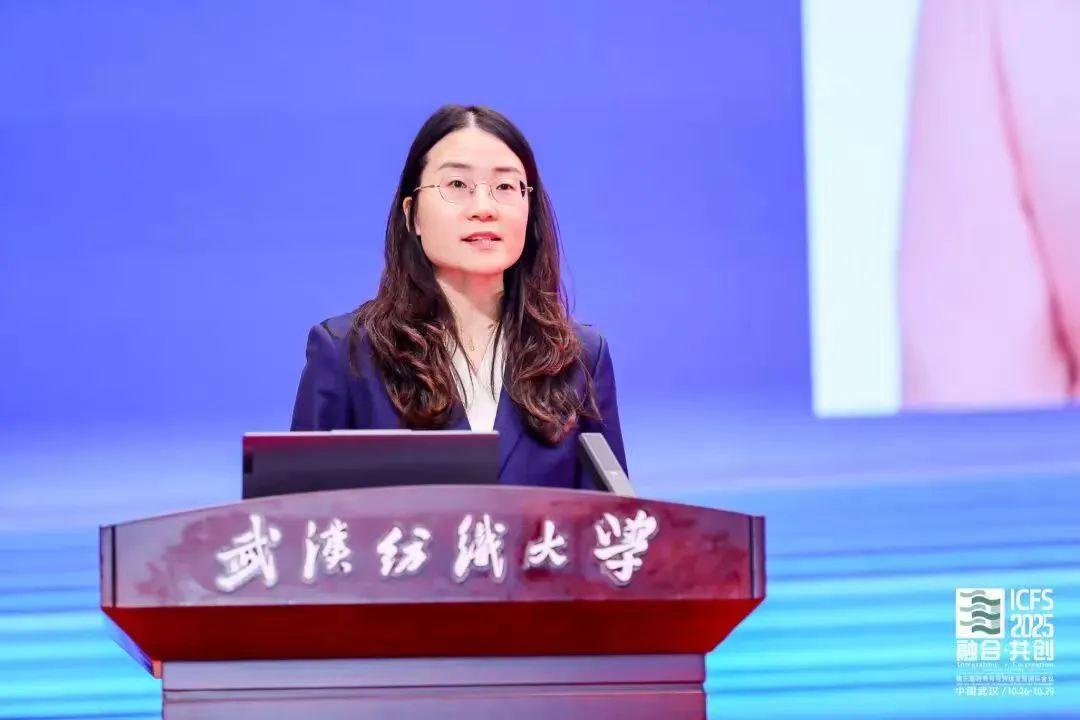
Bai Jing, Secretary-General of the China Textile and Apparel Education Society, stated in her opening speech that the conference's theme, "Integration and Co-creation: Technology and Culture Driving Sustainable Fashion Development," accurately follows the pulse of the times and profoundly addresses industry concerns. She emphasized that the global fashion industry is undergoing a profound green revolution and intelligent transformation, and higher education institutions, as important bases for talent cultivation and technological innovation, play an irreplaceable leading role. Bai Jing particularly recognized the "Strength of Wuhan Textile University" in serving national major strategies and its solid support of technology and talents for the industry's sustainable transformation.
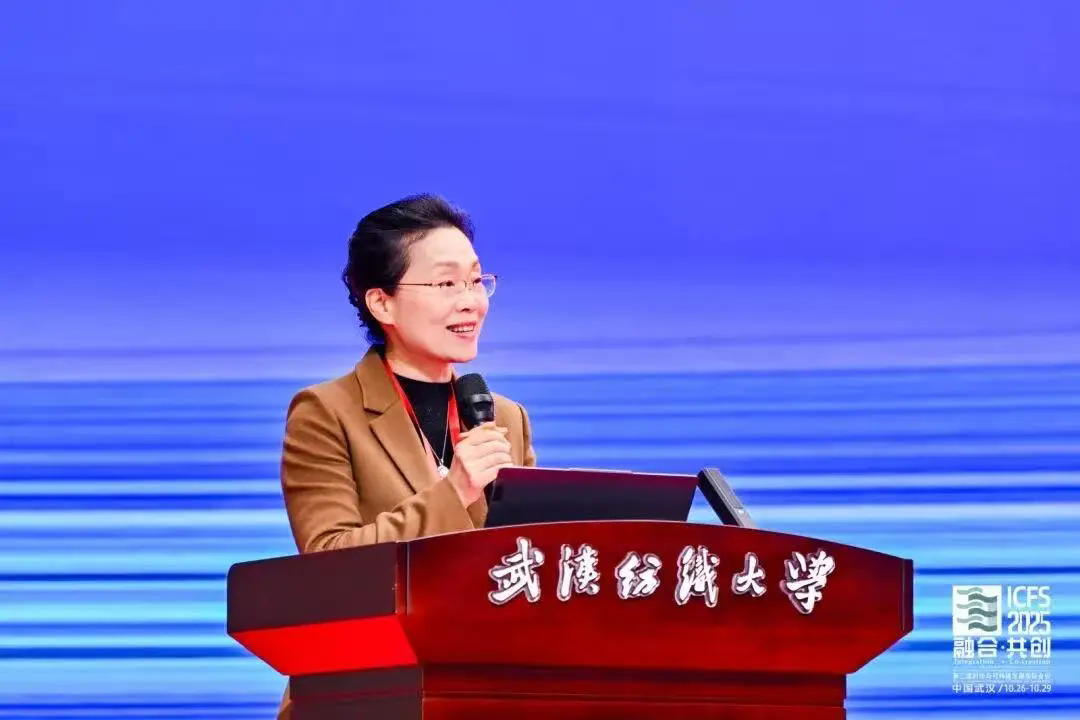
Following the opening ceremony, the keynote forum was held, chaired by Wang Dong, Vice President of Wuhan Textile University; Professor Patsy Perry from the Manchester Fashion Institute at Manchester Metropolitan University, UK; and Professor Fan Jintu, Director of the Research Centre for Smart Fashion and Textile Technology at The Hong Kong Polytechnic University.
The core topics and experts present (in order of appearance) are as follows:
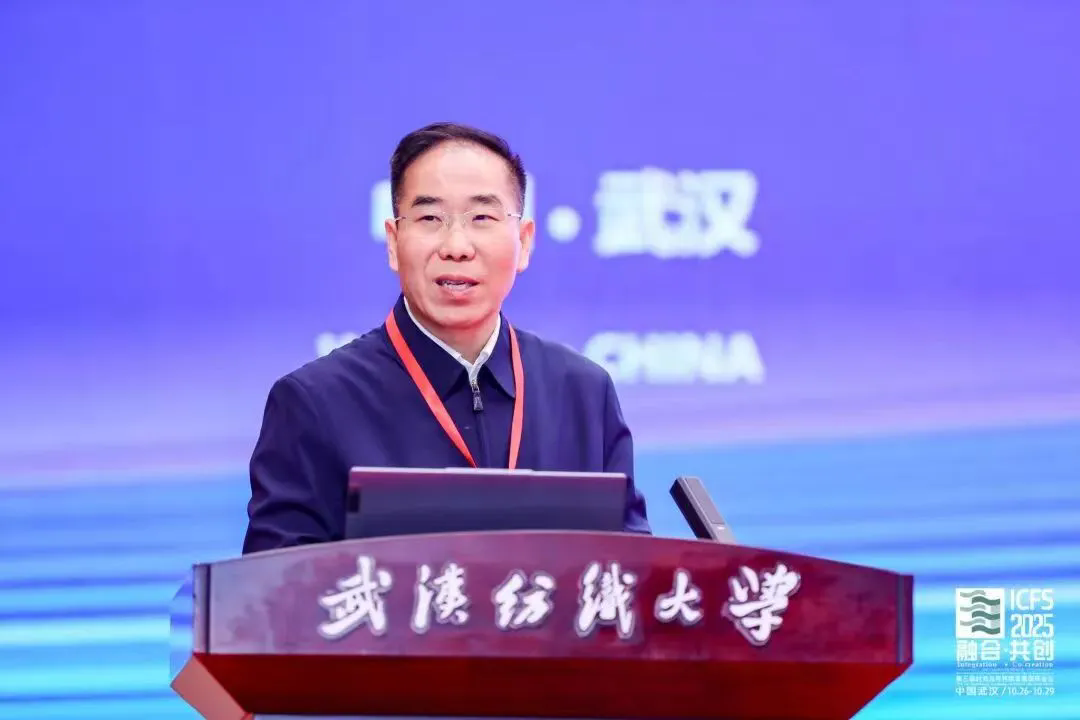
Xu Weilin (Academician of the Chinese Academy of Engineering, Secretary of Party Committee of Wuhan Textile University), Topic: Fashion and Sustainable Development of Textiles and Apparel
Xu Weilin focused on the fashion and sustainable development of the textile and apparel industry. He pointed out that in recent years, guided by the principles of "technology, fashion, green, and health," China's textile and apparel industry has accelerated the development of new quality productive forces. Driven by the cores as material innovation, advanced processing, and green technologies, the industry is achieving high-quality development. He further analyzed how cutting-edge technologies such as new textile materials, eco-friendly dyeing techniques, and plant-based dyeing technologies empower fashion design. Through the deep integration of waste textiles and sustainable technologies, a new green and eco-friendly industrial ecosystem is being built, ultimately promoting the transformation and upgrading of the fashion industry towards high-end, intelligent, and green development, providing a developmental path for constructing a modern fashion industry system empowered by technology and led by design.
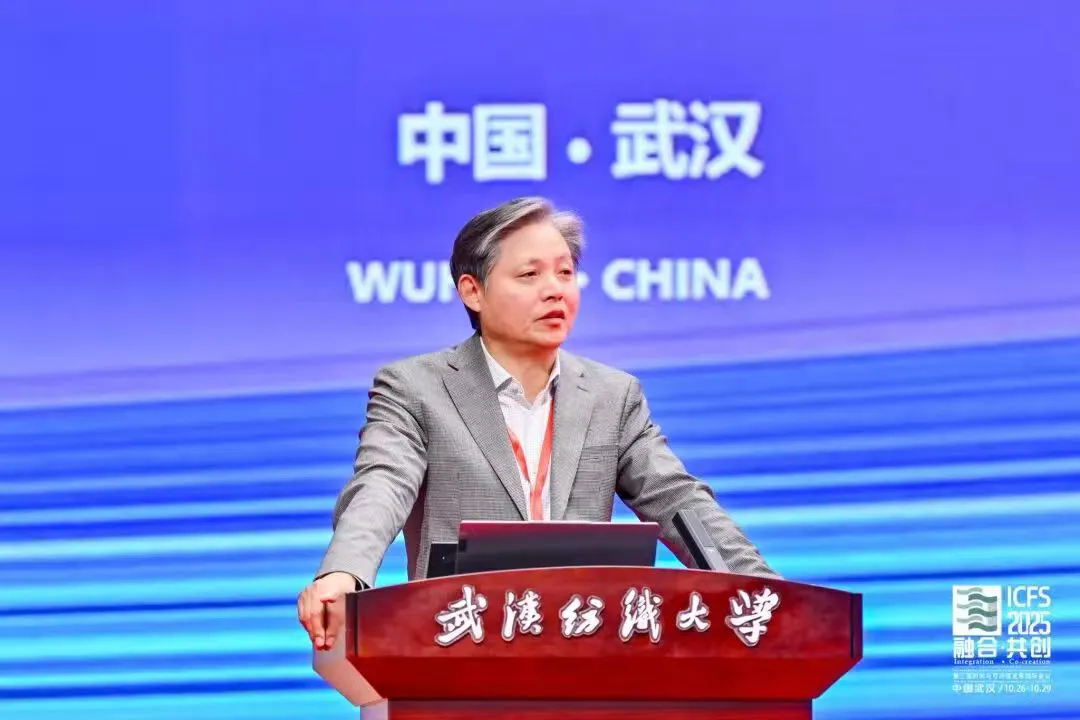
Fan Jintu (Director of the Research Centre for Smart Fashion and Textile Technology at The Hong Kong Polytechnic University), Topic: Intelligent Adaptive Textiles and Wearable Technology
Fan Jintu pointed out that facing global warming and frequent extreme weather challenges, intelligent adaptive textiles and wearable technology are crucial for maintaining human comfort and performance in different environments. He reviewed previous research in the field and highlighted his team's innovative achievements in areas such as Plant architectural models,Thermal response bionic fabrics, Humidity-responsive porous fabrics, and thermoelectric cooling garments.
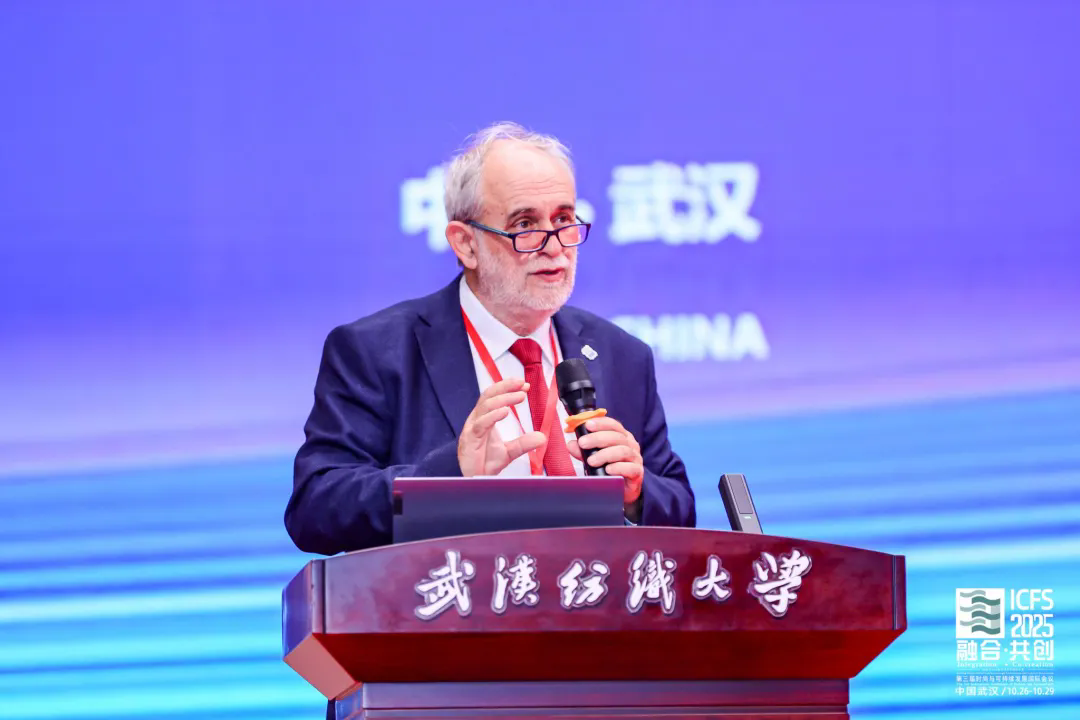
Savvas Vassiliadis (Professor at the University of West Attica, Greece, Former President of AUTEX), Topic: Smart Textiles, Energy Harvesting, and "Concerns" in Design
Savvas Vassiliadis discussed the new challenges that smart textiles and energy harvesting technologies bring to the field of fashion design. He pointed out that energy harvesting systems based on principles such as thermoelectric and piezoelectric effects are core modules of smart textiles. Their deep integration into clothing provides functionality but also significantly impacts the design process, limits the diversity of aesthetic expression, and leads to convergence in the works of different designers. He emphasized that this situation places higher demands on the design process, requiring designers to create under technical constraints. This both drives the development of more user-friendly and easily integrated components and highlights the importance of cultivating design talent with both technical backgrounds and innovative capabilities.
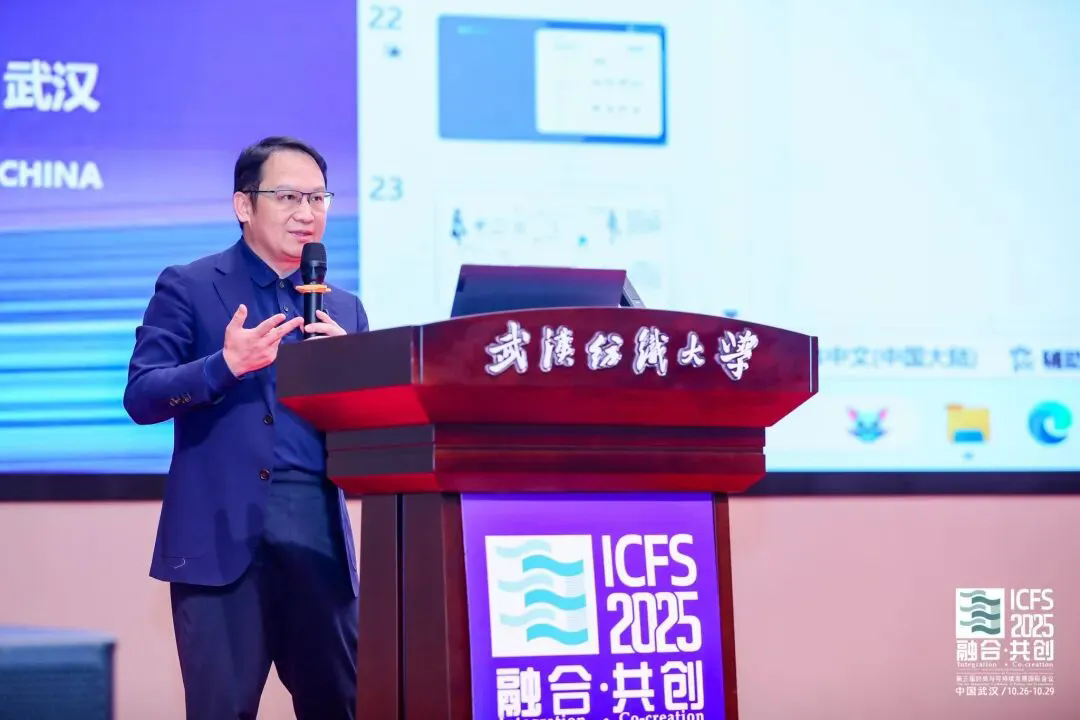
Liu Chen (Founder and CEO of Zhejiang Style3D Co., Ltd., Topic: Industrial Iteration and New Opportunities in Education in the Digital Intelligence Era
Liu Chen discussed the profound changes brought by digital intelligent technology to the fashion industry and education system. He pointed out that key technologies such as 3D design and digital twins are driving the digital transformation of the entire chain of R&D, production, and marketing, accelerating industrial iteration. This transformation places new demands on talent cultivation, urging education to update its curriculum systems, practical models, and knowledge structures simultaneously. A new paradigm of industry-education integration is needed to address the new opportunities of the digital intelligence era and build a new quality talent pool for the sustainable development of the industry.
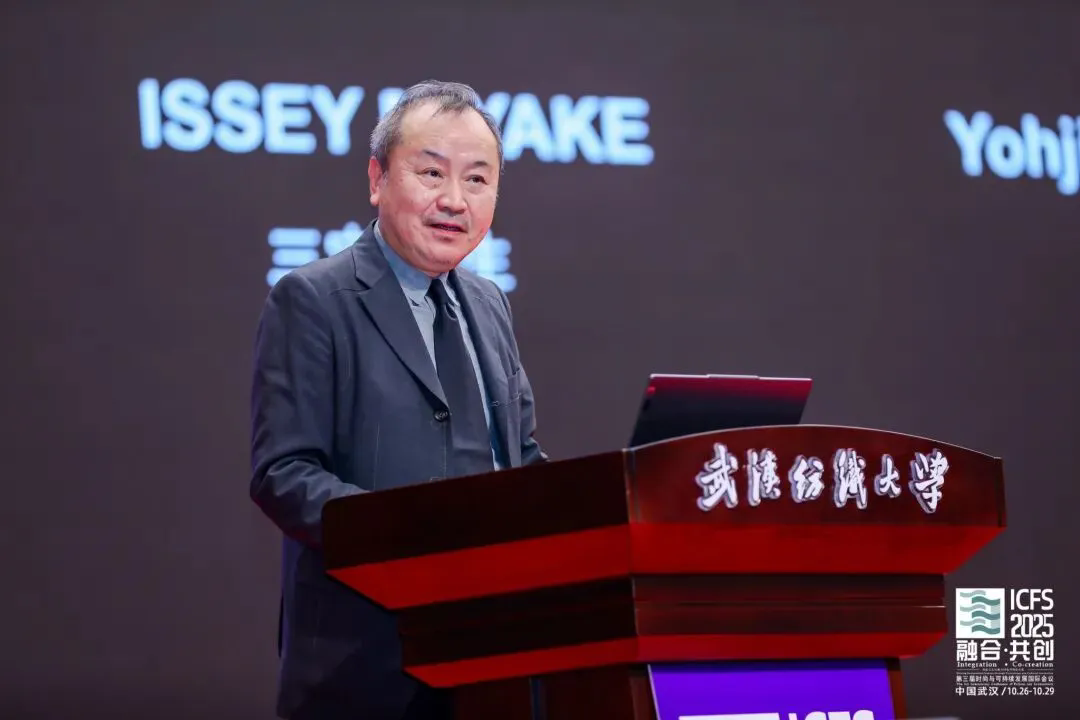
Shinichi Kushinomachi (President of Bunka Fashion Graduate University, Japan), Topic: Creating Clothing that Inspires New Thinking and Lifestyles
Shinichi Kushinomachi proposed that clothing-making is a creative practice connecting inner "thought" with outer "action," effectively catalyzing changes in personal life states. He emphasized that the complete process from conception to finished garment forms a micro-cycle, transforming abstract desires for change into concrete, tangible outcomes. By personally participating in this material creation, individuals not only gain a sense of accomplishment and self-efficacy but also continuously consolidate and internalize new self-perceptions through the medium of "clothing" worn daily. Research shows that clothing production is not just skill acquisition but a powerful practical philosophy of "self-shaping."
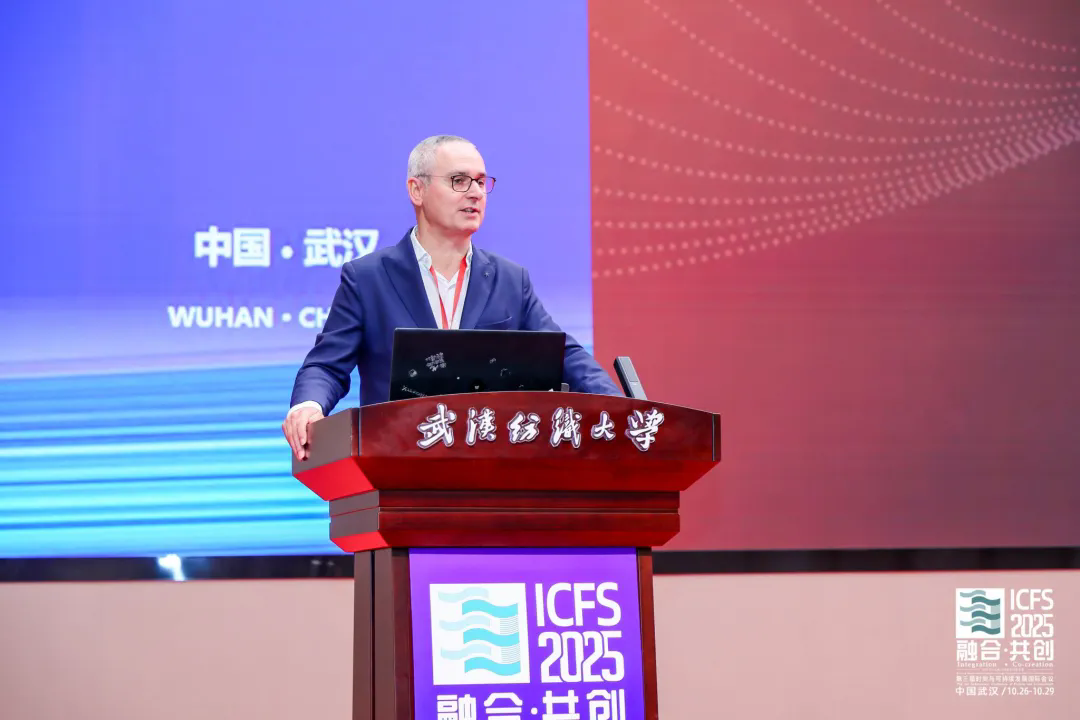
Raul Fangueiro (Vice Dean of the School of Engineering, University of Minho, Portugal), Topic: Rethinking Natural Waste: Transforming Bio-Based Residues into High-Value Materials
Raul Fangueiro focused on the value reconstruction of natural waste. His research team is dedicated to transforming agricultural by-products such as banana leaves and pineapple leaves, as well as marine waste algae, into high-value fiber materials through biological and physical technologies. Specific innovations include using pectinase treatment to optimize fiber properties, developing solutions suitable for non-woven fabrics and bio-based composites; extracting eco-friendly pigments from algae to replace synthetic dyes; and developing nanofiber membranes based on polycaprolactone and chitosan for textile wastewater treatment. This research provides the textile industry with a sustainable circular path from waste to high-performance materials, strongly promoting the industry's green transformation and resource efficiency.
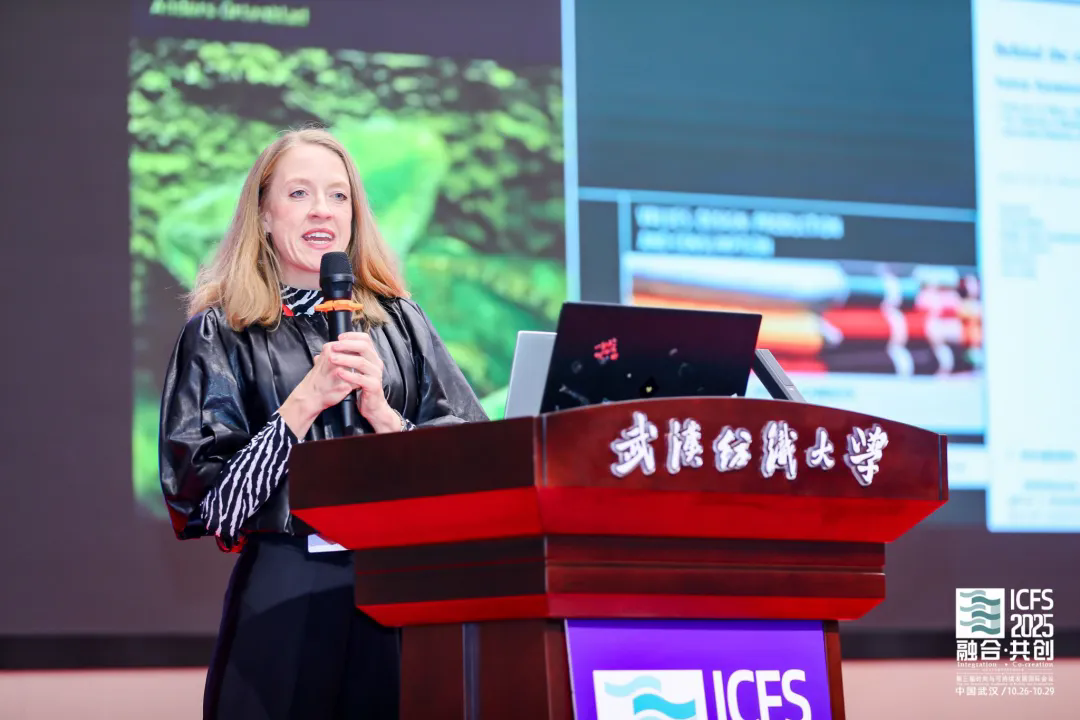
Patsy Perry (Professor at the Fashion Institute of Manchester Metropolitan University, UK), Topic: Challenges of Sustainability and Craft Narratives in Luxury Brands
Patsy Perry discussed the challenges faced by sustainability and craft narratives in luxury brands. She pointed out that with recent ethical controversies, the "craft narratives" often used by luxury brands to substantiate their quality are being questioned for authenticity. The presentation traced the evolution of luxury brands pursuing market growth through licensing, online retail, and production outsourcing, and examined their core values when facing growing demands for transparency and responsibility towards people and the planet. The research further contemplated pathways for integrating luxury with sustainability concepts, exploring how they can jointly maintain the superiority of luxury brands in quality and value.
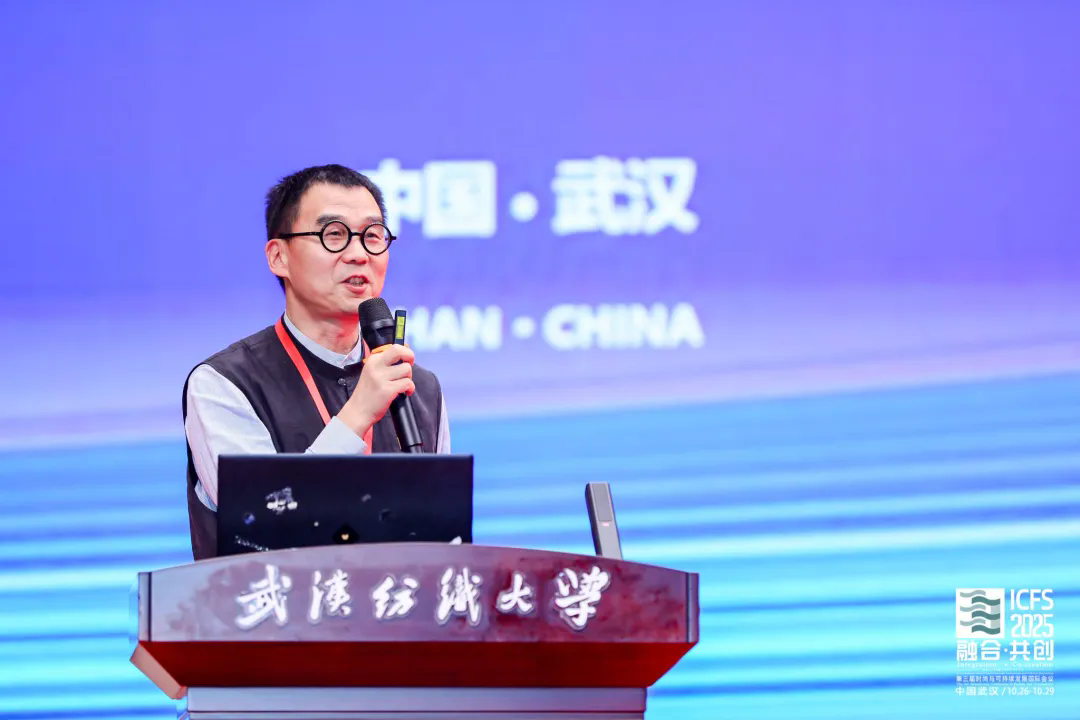
Cui Rongrong (Dean of the School of Fashion Design, Zhejiang Sci-Tech University), Topic: Sustainable Fashion and Digital Intelligence Design Pathways
Cui Rongrong focused on the challenges of sustainable transformation in the fashion industry against the backdrop of the global climate crisis and consumption reflection. He proposed that digital intelligence technology, with its efficiency, precision, and innovation, is a key path to solving the problems of resource consumption and waste textile recycling. The report explored the integration possibilities of sustainable fashion and digital intelligence design from policy, industry, and cultural dimensions. Using the School of Fashion Design at Zhejiang Sci-Tech University as a case study, he explained an overall plan based on three dimensions: "New Fashion Technology, New Lifestyle Trends, and New Civilizational Traditions." By introducing the "Digital Intelligence+" concept and generative design, traditional patterns and clothing are revitalized, building a new sustainable fashion ecosystem where technology, life, and civilization coexist and flourish together.
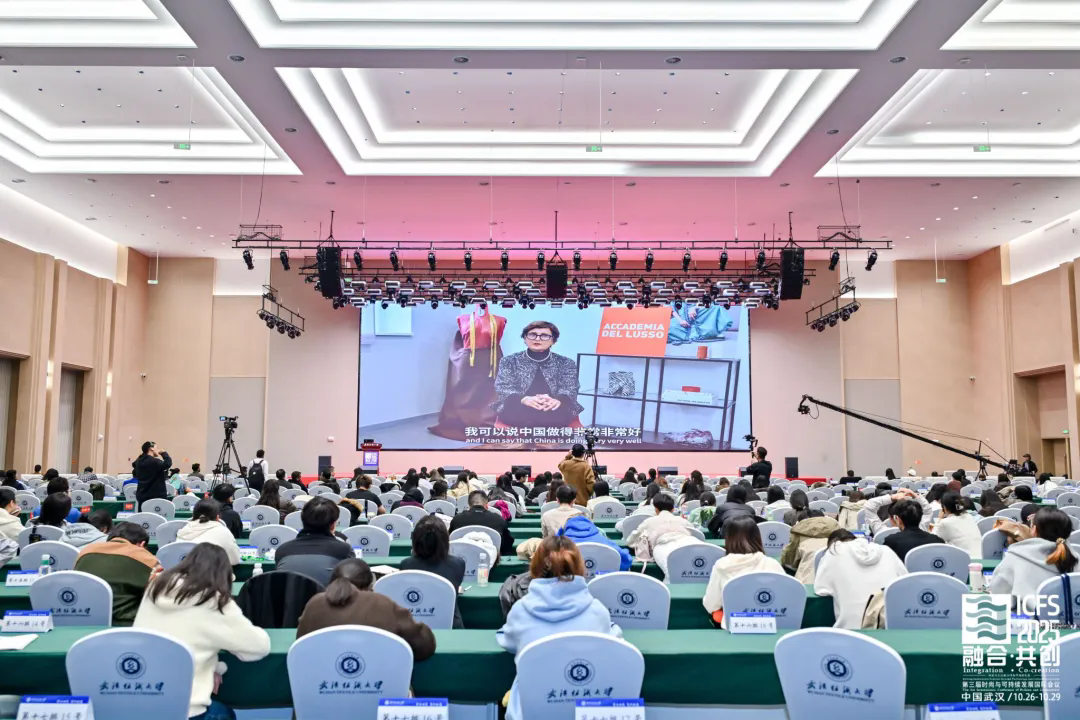
Marina Spadafora (Strategic Director of the Textile and Fashion Design Department at the Italian Institute of Applied Art and Design, Italy), Topic: Redefining the Future of Sustainable Fashion
Marina Spadafora delivered a discourse centered on "Redefining the Future of Sustainable Fashion." She pointed out that the fashion industry is facing profound ethical and ecological transformation needs, urgently requiring responses through design innovation, material revolution, and production model restructuring. The report emphasized that designers should transcend traditional roles to become practitioners and advocates of sustainable concepts, integrating fair trade, localized production, and cultural respect into the entire creative process. This promotes the shift of fashion from a resource-consuming industry to a new paradigm encompassing aesthetic value, social responsibility, and environmental awareness, ultimately achieving reconciliation and symbiosis between the industry and the planet.
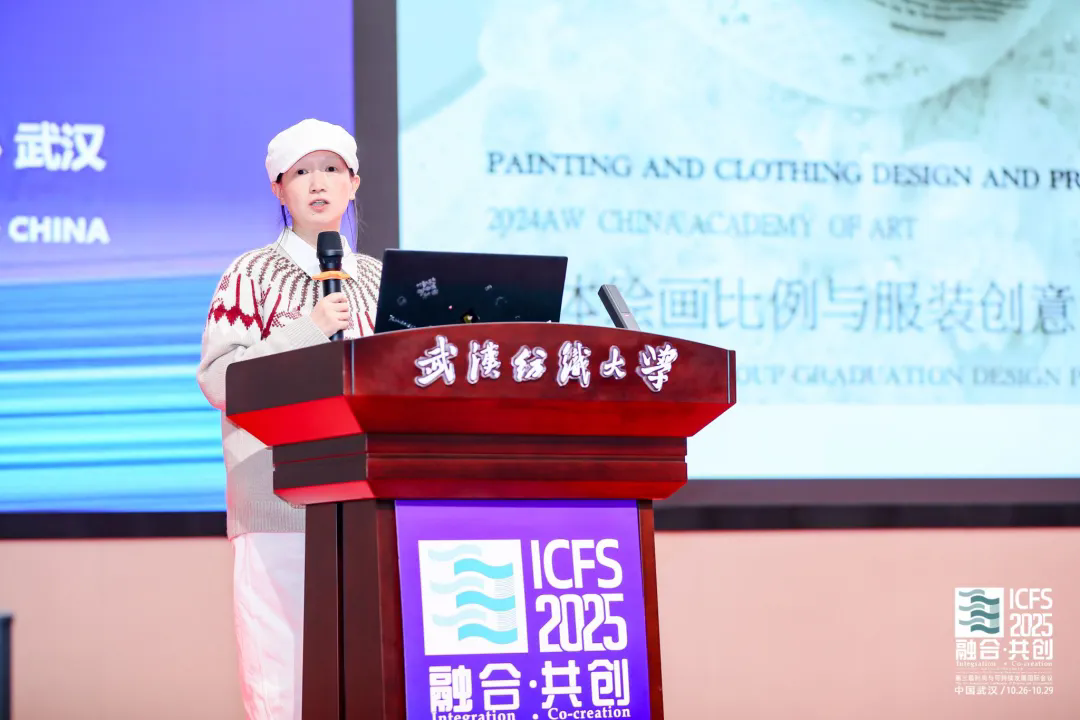
Ling Yali (Vice Dean of the School of Fashion Design, China Academy of Art), Topic: Human Body Drawing Proportions and Creative Clothing Design and Production
Ling Yali delved into the integrated creative process from design conception to physical realization in her report. She emphasized the importance of designers personally experiencing the entire process from sketch to finished product—the dynamic lines on paper carry infinite imagination, and only the designer themselves can most accurately convey their creative intent. This authorial control throughout the process allows design, styling, and craftsmanship to organically unify, yielding results far superior to conventional models delegating implementation to others. Through stylized designer cases, the report systematically analyzed a new design process from human body proportion research to creative styling realization, showcasing the diversity and uniqueness of creative pathways under the integrated design model.
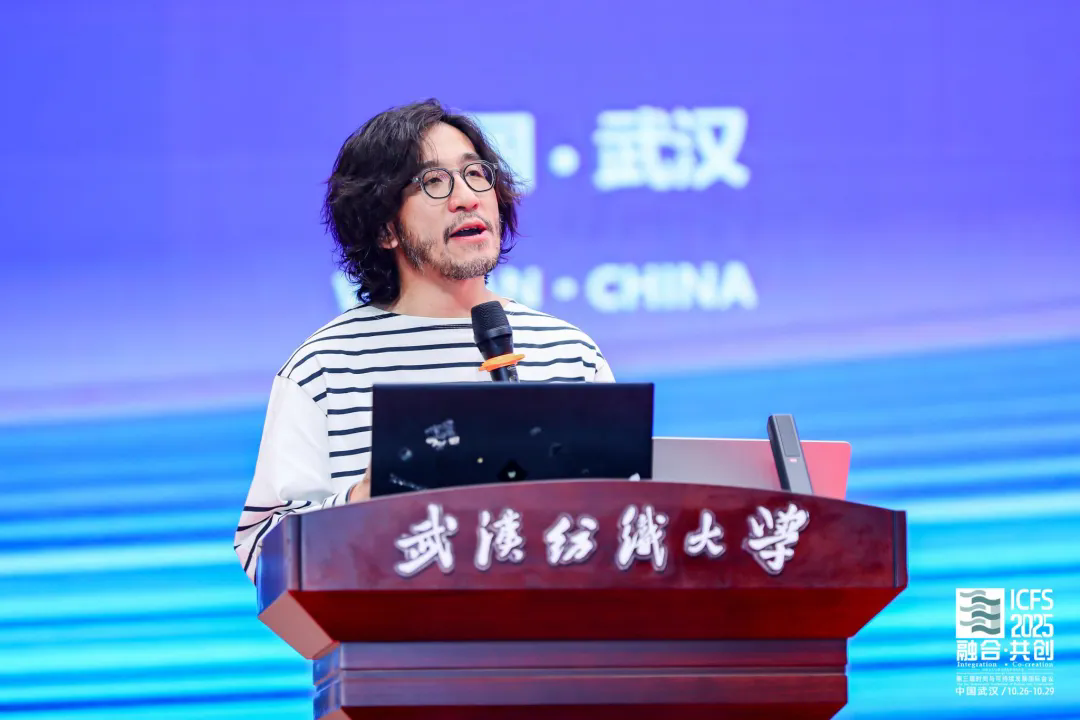
John Lau (Dean of Academic Strategy, London College of Fashion, University of the Arts London), Topic: Metamorphosis: Education Leading the Technological Advancement of Knowledge and Skills in the Fashion Industry
John Lau stated in his report that the fashion industry is undergoing a profound transformation driven by environmental responsibility, socio-cultural factors, and economic stability. He emphasized that educational institutions are at the forefront of leading this change and have the responsibility to reshape the industry's future by setting new standards and expanding collaborative boundaries. New open and collaborative educational models can stimulate the synergistic creativity of talent and machines, cultivating a new generation of digital natives who possess both traditional spirit and contemporary vision. The "Metamorphosis" pan-European project introduced in the report is a successful practice of the London College of Fashion's deep symbiosis and co-transformation with the industry, providing a replicable transformation framework for major global design and manufacturing centers.
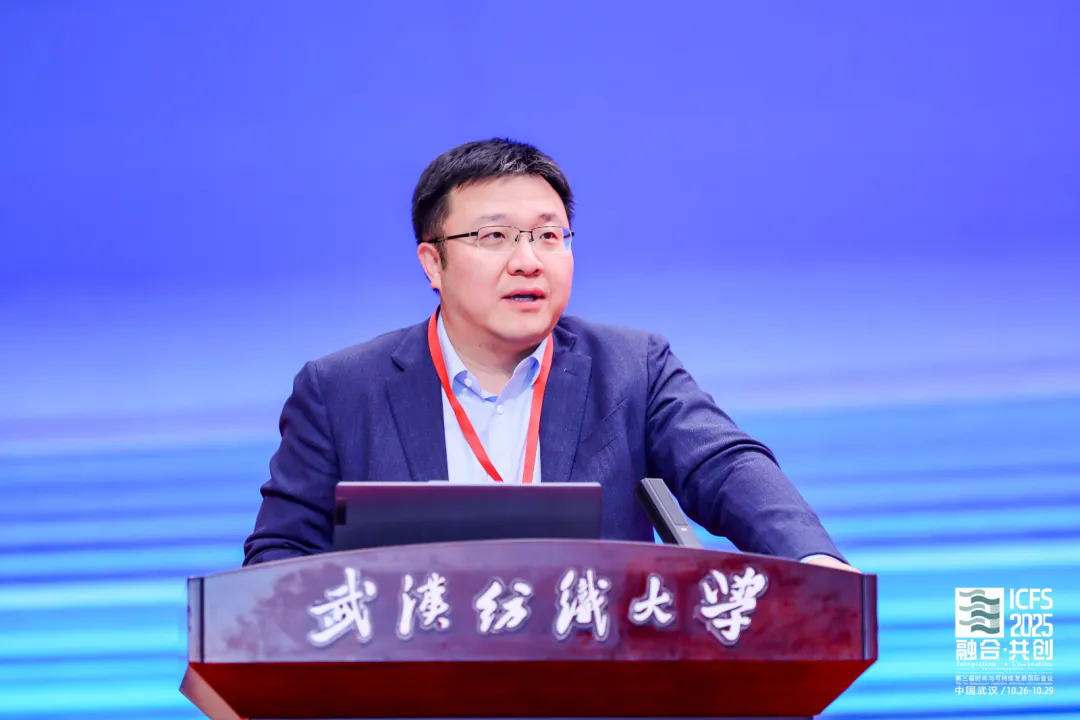
This forum gathered global wisdom, highlighting the profound transformations in the fashion industry across the three dimensions of sustainability, digital intelligence, and cross-cultural exchange. Participating experts jointly explored the symbiotic relationship between technological empowerment and humanistic ethics, breaking disciplinary boundaries through industry-academia-research collaboration to build a future fashion ecosystem characterized by resilience, inspiration, and vitality.
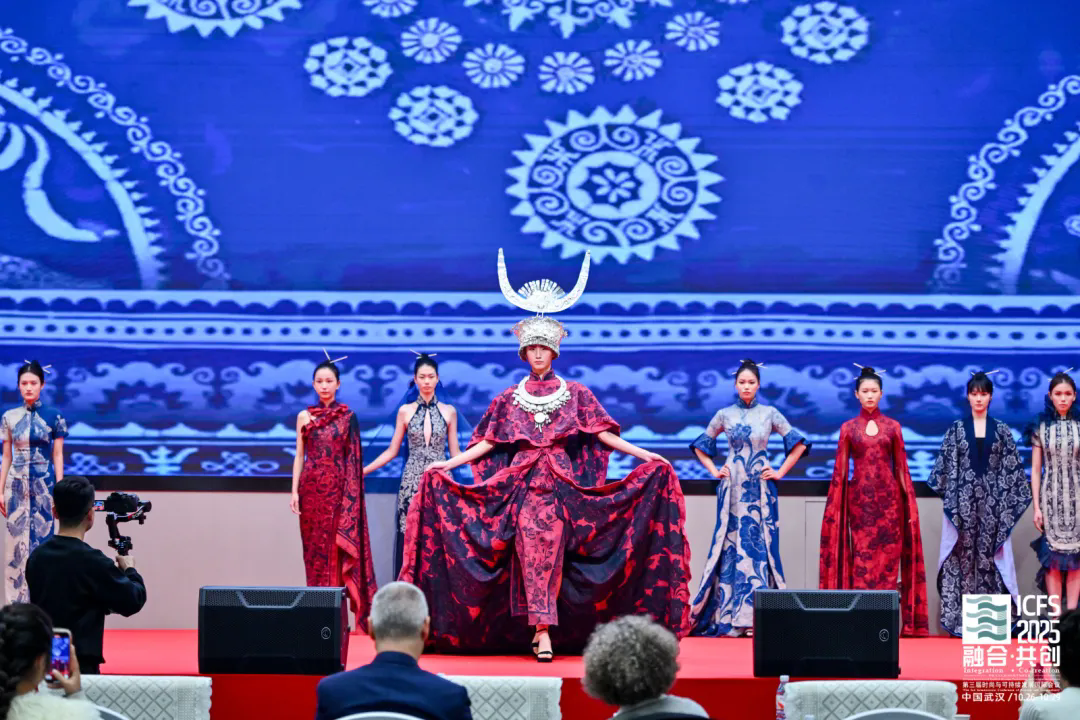
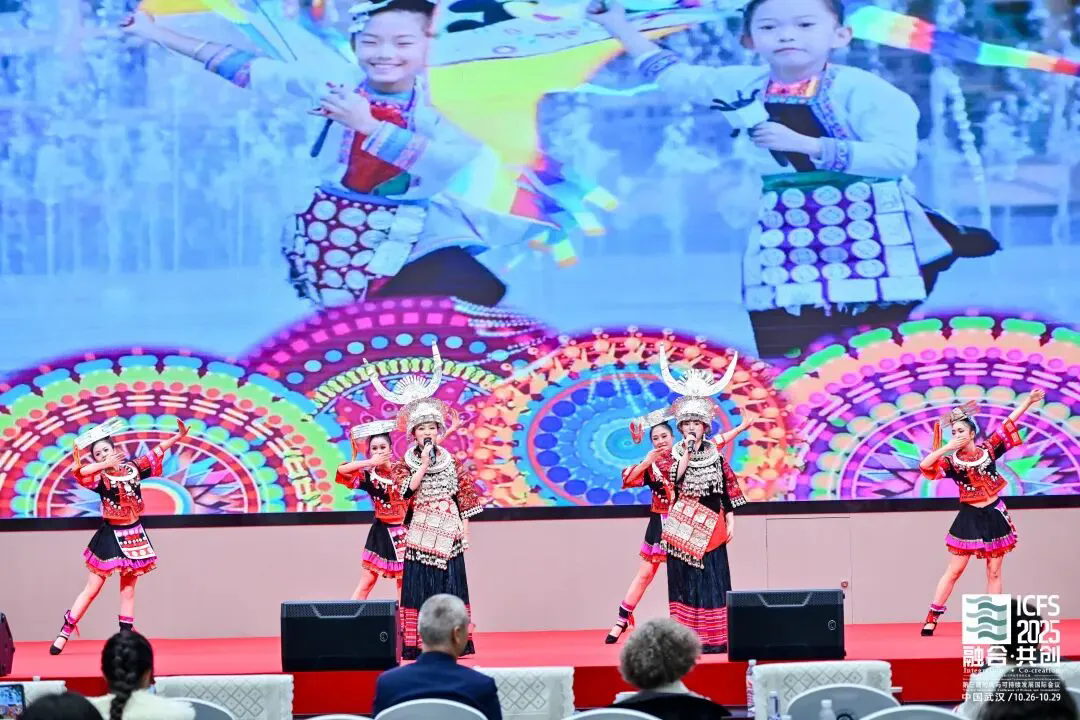
After the keynote forum, artists from Qiandongnan Prefecture in Guizhou Province presented a cultural feast for the attendees with intangible cultural heritage performances such as Dong Ethnic Grand Choirs and Pipa singing. Yang Guoxiang, Deputy Director of the Qiandongnan Prefecture Culture, Sports, Radio, Television, and Tourism Bureau, delivered a speech, systematically introducing the rich intangible cultural heritage of Qiandongnan to global scholars and extending sincere wishes for the successful convening of the conference, demonstrating the deep integration of cultural heritage and the theme of sustainable fashion development.
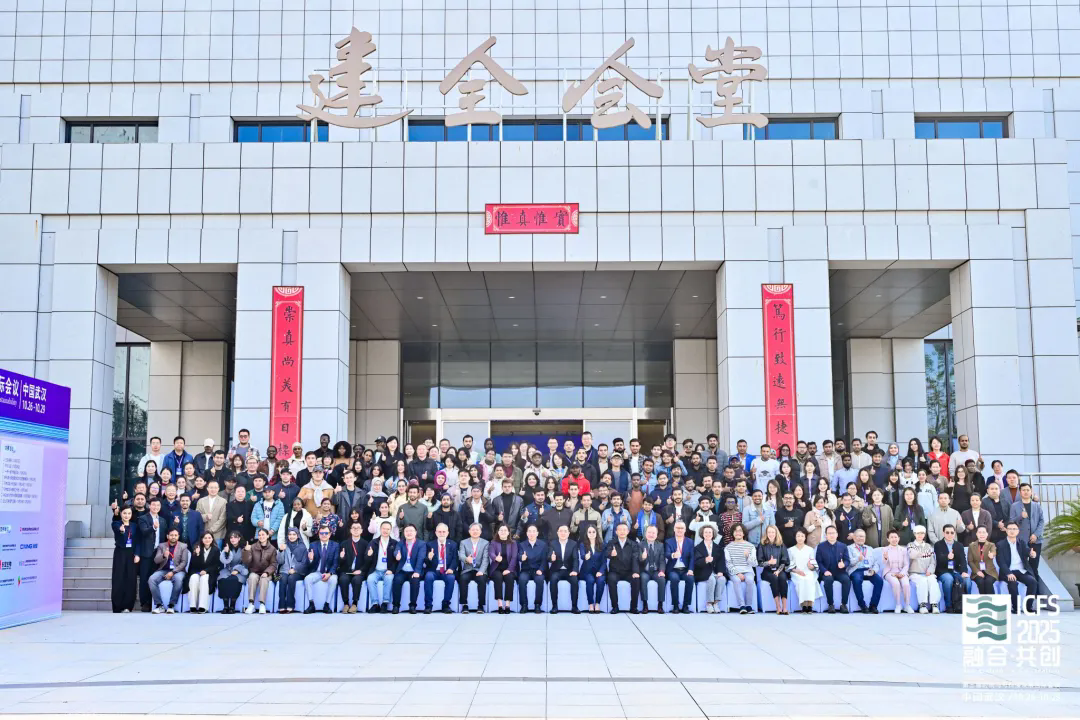
The opening of the third International Conference on Fashion and Sustainability marks a new stage of collaboration in the fields of technology, culture, and sustainability within the global fashion industry. Attendees unanimously agreed that only through cross-border integration and open co-creation can a future industry characterized by resilience, responsibility, and aesthetics be built.
"Belt and Road" Fashion Sustainability and Design Education Special Forum
On the morning of October 28, the "Belt and Road" Fashion Sustainability and Design Education Special Forum was held at the Jianquan Auditorium of Wuhan Textile University.
This forum focused on innovative development paths for fashion education and international cooperation under the "Belt and Road" initiative, bringing together experts, scholars, industry leaders, and research elites from the fashion education sectors of China, Bangladesh, Pakistan, Egypt, Sudan, Australia, and other countries to jointly explore new models of international cooperation for the sustainable development of the fashion industry. The forum's opening ceremony was presided over by Professor Tao Hui, Dean of the School of Fashion at Wuhan Textile University.
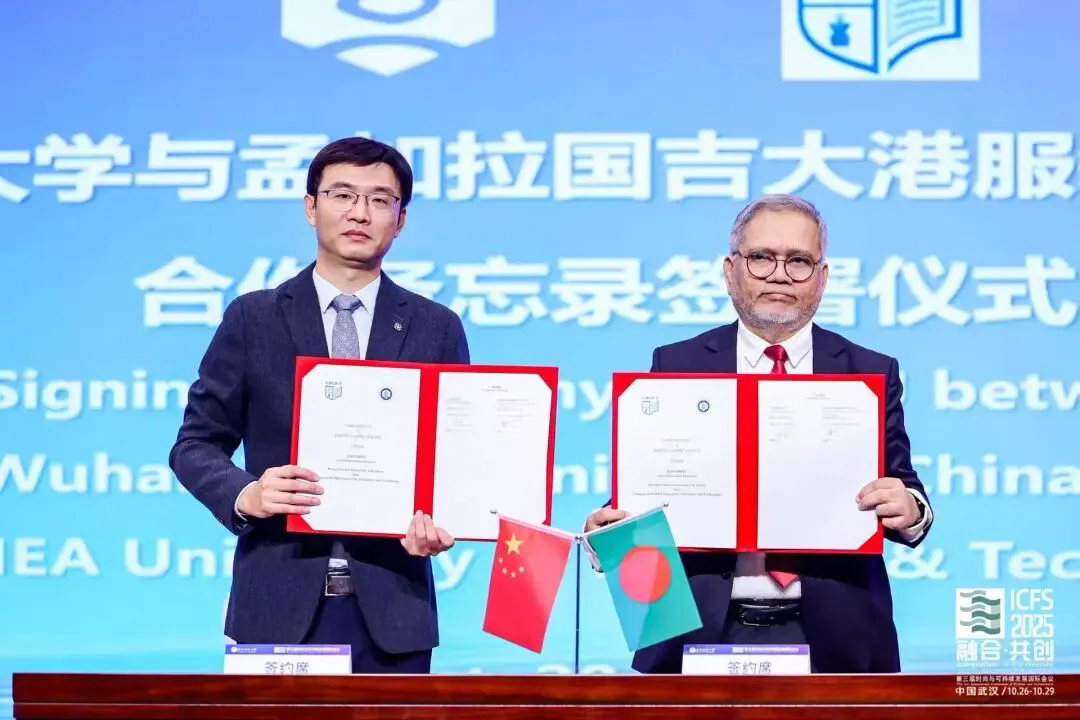
Ji Chen, Director of the International Exchange and Cooperation Office at Wuhan Textile University, delivered the opening speech. He mentioned that against the grand backdrop of the "Belt and Road" initiative, the fashion industry, as an important carrier of cultural exchange and economic and trade cooperation, is ushering in unprecedented development opportunities. Wuhan Textile University hopes to use this forum as a high-level international dialogue platform to promote knowledge sharing, mutual learning of experiences, and deep integration of industry, academia, and research.
On behalf of the university, Director Ji Chen signed memorandums of understanding with four renowned universities along the "Belt and Road," including Chittagong BGMEA University of Fashion & Technology (CBUFT) and BGMEA University of Fashion & Technology (BUFT) from Bangladesh, as well as National Textile University (NTU) and University of Management and Technology (UMT) from Pakistan. The signing of these cooperation agreements marks a further expansion and deepening of the "Belt and Road" fashion education cooperation network.
Converging Wisdom: Charting a Course for Development with shared vision
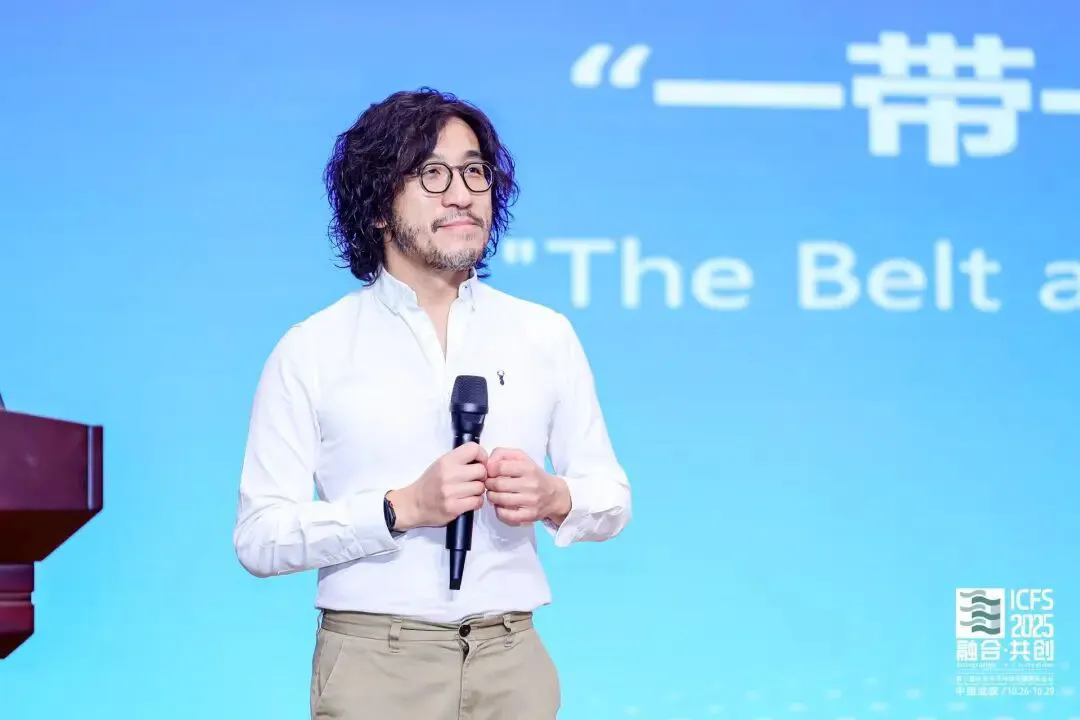
During the keynote report session, multiple guests from domestic and international universities and enterprises engaged in in-depth exchanges on topics such as "Belt and Road" fashion education cooperation, green technology sharing, intelligent manufacturing, sustainable material development, and cross-cultural communication, presenting a feast of ideas interwoven with diverse perspectives. John Lau, Academic Strategy Director at London College of Fashion, University of the Arts London, served as the academic chair.
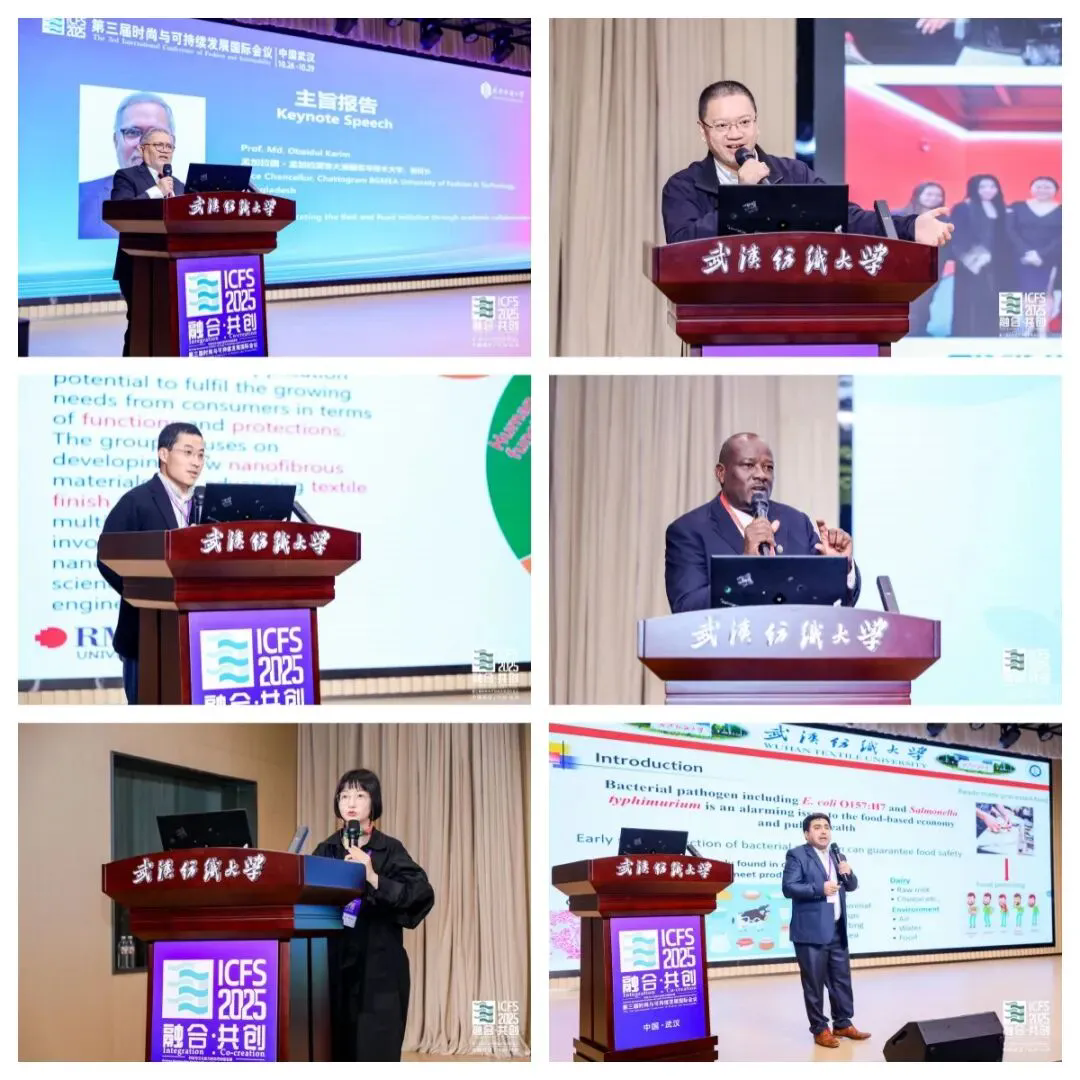
In his report, Md. Obaidul Karim, Vice Chancellor of Chittagong BGMEA University of Fashion & Technology (CBUFT), Bangladesh, reviewed the glorious history of the ancient Silk Road and pointed out: "The 'Belt and Road' initiative is driving a new wave of economic and cultural exchange. Educational cooperation is an important bridge connecting countries along the route. We need to establish closer academic networks to jointly cultivate fashion industry talent with global vision."
Representing the industry, Mr. Li Lijun, Vice President of Ningbo Cixing Co., Ltd., in his speech titled "Digital Intelligent Production Reshaping the New Pattern of the Global Knitted Apparel Industry Chain," detailed the profound changes brought by artificial intelligence, industrial internet, and cloud technologies to the knitting industry. Through specific cases, he demonstrated how smart manufacturing is promoting the green transformation of the traditional textile industry, providing practical industrial upgrading solutions for countries along the "Belt and Road."
Leading innovation: Driven by the dual Engines of Technology and Culture.
Cross-cultural research provided new dimensions for thinking about sustainable development. Dr. Rao Xian, Director of the Fashion Communication Department at Wuhan Institute of Design and Sciences, emphasized after comparing Eastern and Western social contexts: "The communication of sustainable fashion must consider cultural differences. In 'Belt and Road' cooperation, we need to establish a culturally adapted communication system." This insight provided important implications for cultural integration in transnational cooperation.
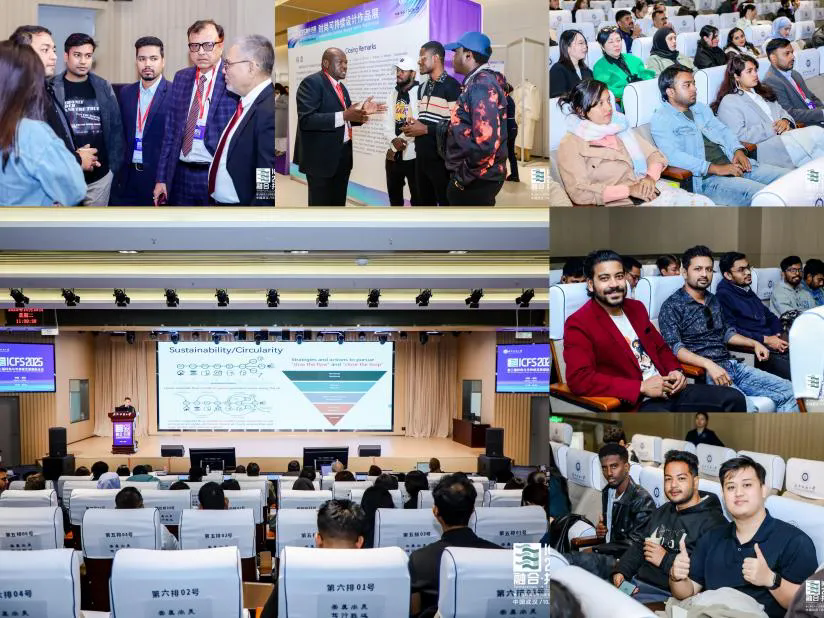
Technological innovation became a hot topic at the forum. Haroon Abdelrahman Mohamed Saeed from University of Gezira, Sudan, presented the latest applications of sustainable bio-films in food packaging; Associate Professor Wang Xin from Royal Melbourne Institute of Technology (RMIT University), Australia, deeply discussed the role of material innovation in promoting fashion sustainability; Dr. Hussain Wajid, a Pakistani postdoctoral researcher at Wuhan Textile University, shared breakthrough progress in biodegradable biosensors for cutting-edge detection technologies. These research achievements demonstrated the great potential of "Belt and Road" countries in sustainable technology R&D.
Co-creating the Future: Fostering a New Ecosystem for the Fashion Industry.
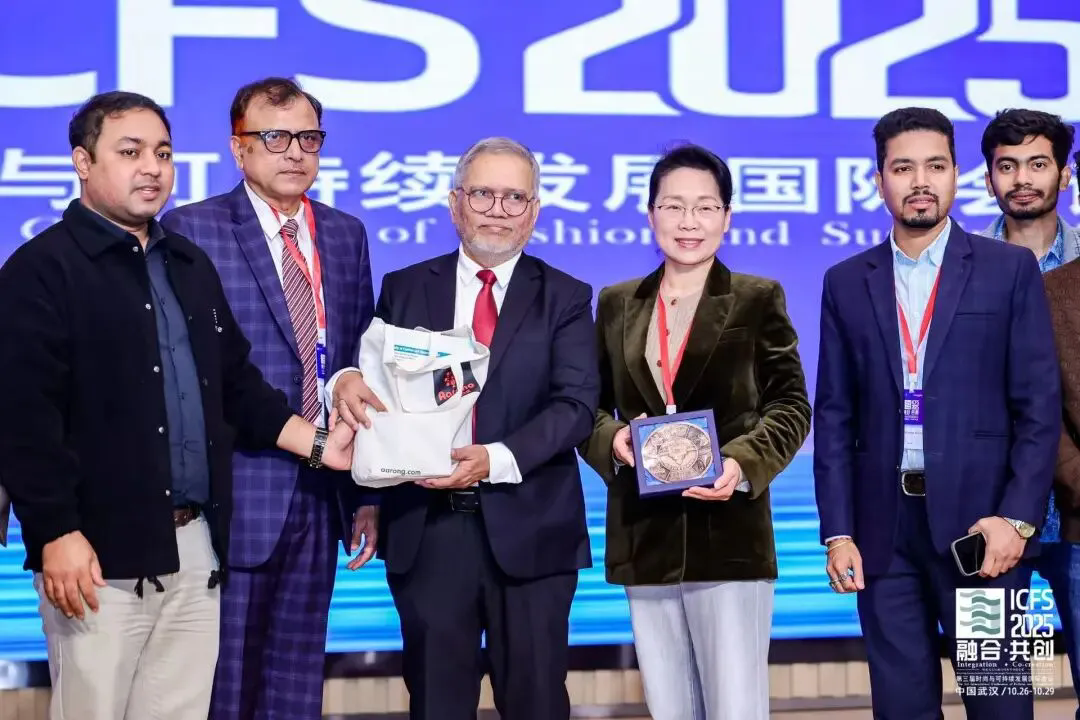
The forum concluded amidst lively exchanges, but the new chapter of "Belt and Road" fashion industry cooperation has just begun. Representatives from various countries expressed that they would take this forum as an opportunity to further deepen practical cooperation, jointly promote the global fashion industry's transformation towards greening, intelligence, and globalization, and contribute the power of the fashion industry to building a community with a shared future for mankind.
Chinese and Foreign Experts Discuss New Paths for Sustainable Fashion Design Education, Reaching Consensus and Issuing the Wuhan Initiative
On October 28, 2025, the "Sustainable Fashion Design Education Workshop," an important segment of the third International Conference on Fashion and Sustainability, was successfully held at Wuhan Textile University. Experts, scholars, international students, and educators from 13 countries including Australia, the UK, Bangladesh, India, and Pakistan gathered to engage in in-depth discussions on the practical innovation, real-world challenges, and future directions of sustainable design education. Professor Tao Hui, Dean of the School of Fashion at Wuhan Textile University, presided over the workshop. Through thematic sharing and interactive discussions over nearly two hours, the agenda culminated in the formation of the "Wuhan Initiative on Sustainable Design Education," injecting educational momentum into the global fashion industry's green transformation.
Keynote Address: Charting the Future of Sustainable Design Education Through Diverse Practices
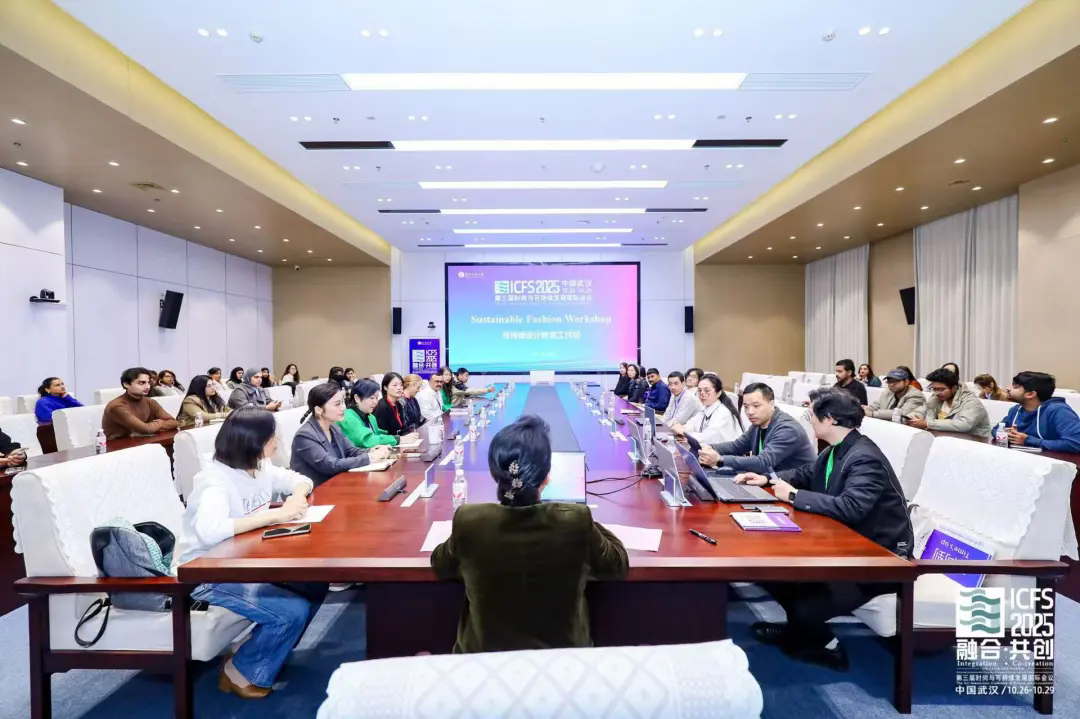
In the first session, Chinese and foreign experts shared cutting-edge explorations and practical achievements in sustainable design education from their respective countries. Wang Xin from RMIT University presented on "Building a Sustainable Curriculum System," detailing the university's teaching innovations in areas like fabric innovation technology and bio-material research and development, providing referable technical pathways for curriculum practice.
Wu Qi from Beijing Institute of Fashion Technology delivered a special report titled "Sustainable Fashion Education under the Dual-carbon Goals: Full-value-chain Transformation and ESG Talent Cultivation." Against the backdrop of dual-carbon goals, she shared the institute's innovations in three teaching models: industry chain collaborative teaching, ESG talent cultivation, and interdisciplinary practice, and offered specific suggestions for sustainable design education.
Subsequently, scholars from Xinjiang Arts Institute, Inner Mongolia Normal University, and Northeast Normal University introduced their educational practices in the sustainable inheritance and innovation of ethnic costumes, combining their respective institutions' regional cultural characteristics, showcasing unique paths for integrating local culture with sustainable concepts.
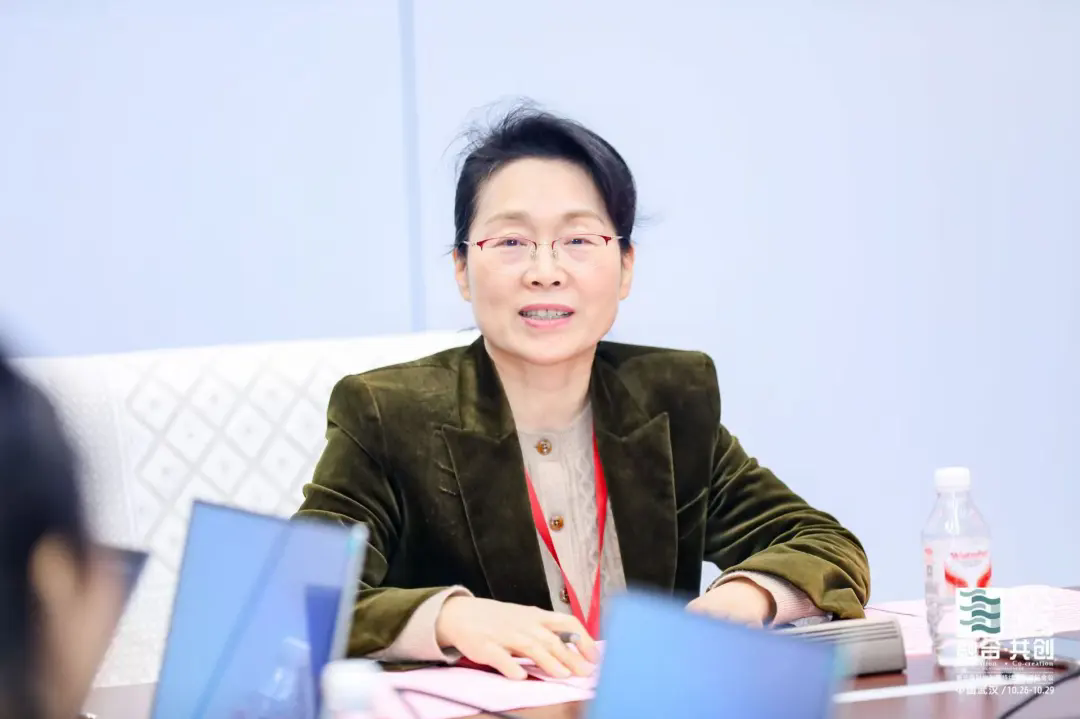
Deep-Dive Session: Navigating Key Challenges — Pathways to Breakthrough in Education
During the interactive discussion session, Dean Tao Hui guided expert dialogue around two topics: "Real-world Challenges in Sustainable Design Education" and "Core Propositions in Student Cultivation." Addressing the difficulties in connecting sustainable design education with the market and consumer behavior, participating experts jointly pointed out that current technological implementation faces bottlenecks, and the high cost of large-scale application of eco-friendly materials hinders the synergistic advancement of industry and education. Simultaneously, there is a contradiction between enterprises' short-term profit orientation and the long-term investment required for sustainable transformation, with most companies reluctant to change existing production models due to cost concerns, leading to limited student practical platforms and unclear career development paths related to sustainability. Furthermore, public perception of sustainable fashion is skewed, overemphasizing design appearance and product price while undervaluing environmental attributes. The high cost of raw materials and processes for eco-friendly products makes them less affordable, further exacerbating the disconnection between education and the market. Therefore, there is an urgent need to guide responsible consumption behavior through public education.
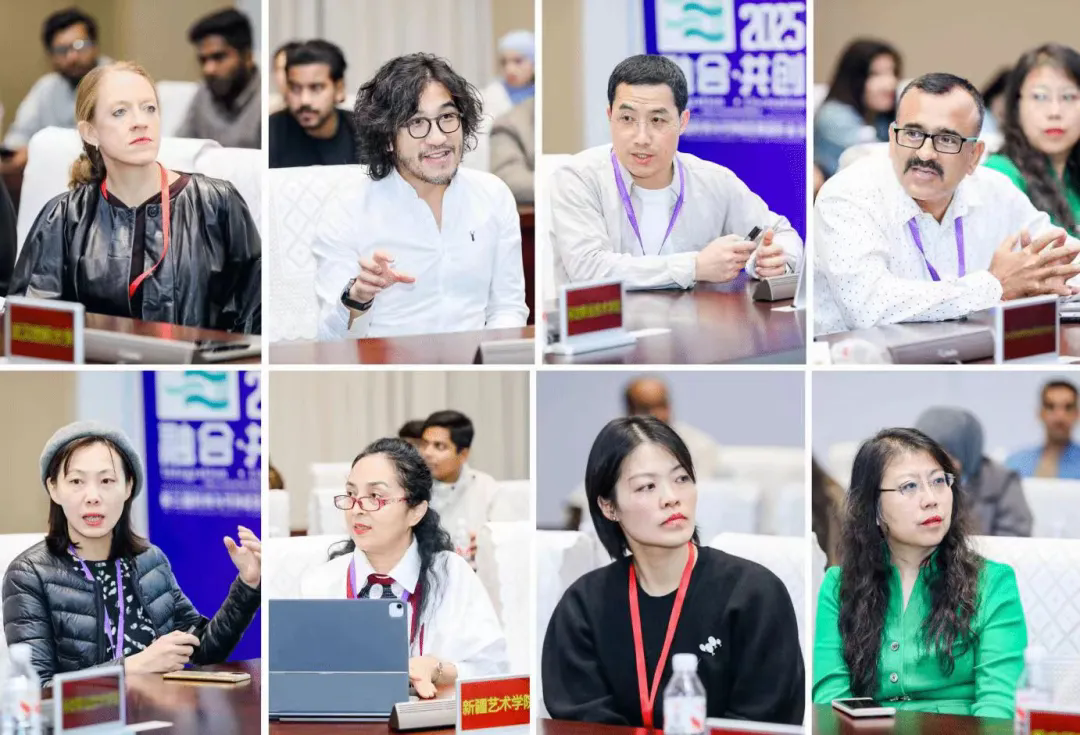
Regarding the balance between the phenomena of students "lying flat" or adopting a "Buddha-like" mindset and personalized education, the participating experts engaged in in-depth discussion. Some scholars pointed out that currently, some students simplify sustainable course assignments to basic fabric modification or old item recycling, failing to understand the breadth and depth of sustainable concepts. It is difficult for them to form a conscious long-term practice after the course ends. This dilemma needs to be resolved through innovations in educational models. Many experts expressed that the core of personalized education lies in giving students space for independent exploration, guiding them to define design goals based on their own interests, and avoiding formalistic practices. Stimulating students' intrinsic motivation is crucial; allowing students to intuitively feel the impact of climate change through field research and visualization of environmental problems can effectively enhance their initiative to participate in sustainable practices. Meanwhile, empowering teaching innovation with technology, using digital tools to broaden practical dimensions, makes personalized education more implementable and attractive. Building cross-disciplinary team collaboration models, integrating the wisdom of students from diverse backgrounds like science and humanities, can strengthen social responsibility through collaboration and solve the dilemma of homogenized practices.
From Consensus to Action: The Wuhan Initiative Leads the Way in Global Education Collaboration
Session Three: Consensus Implementation – Wuhan Initiative Leads Global Educational Collaboration
After full discussion, Chinese and foreign experts reached a broad consensus and formally released the "Wuhan Initiative on Sustainable Design Education." The initiative clearly states: to strengthen cultural mutual learning, organically integrate excellent traditional cultures and local cultural essences from various countries into internationally benchmarked sustainable design curriculum systems; to innovate educational collaboration models, deepen industry-academia-research collaboration, and guide responsible consumption behavior; to jointly build and share educational resources and research results, promote the high-quality development of design education, and collectively become advocates, practitioners, and leaders of the global fashion industry's green transformation. Experts unanimously agreed that sustainable design education must adhere to four principles: "Respecting Individuality, Empowering with Technology, Interdisciplinary Integration, and Career Orientation." It is necessary to give students space for independent exploration, broaden practical boundaries through technological innovation and interdisciplinary integration, align with industry needs to clarify career development paths, and truly internalize sustainable concepts as students' professional literacy and lifestyle.
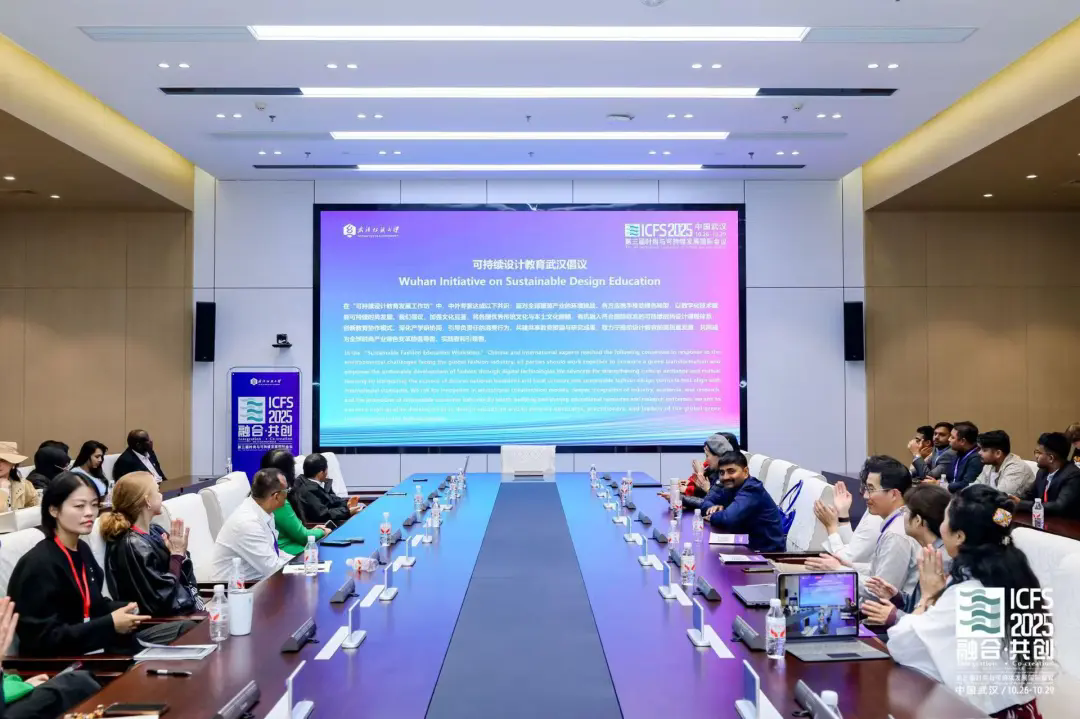
Educational Responsibility: Wuhan Textile University Deepens Sustainable Design Education and Embarks on a New Journey
The successful hosting of this workshop further clarified the core responsibility and era mission of education in global sustainable development. The School of Fashion at Wuhan Textile University has long been deeply engaged in the field of sustainable design education, accumulating rich experience in curriculum system innovation, industry-academia-research collaboration, and international exchange and cooperation. In the future, the school will take this workshop as an opportunity to continuously deepen the reform of sustainable design education, strengthen cooperation with global universities, enterprises, and research institutions, and contribute "WTU Wisdom" to promoting the green transformation of the global fashion industry and achieving sustainable development goals.
Three Parallel Sub-forums
On the afternoon of October 28, the third International Conference on Fashion and Sustainability (ICFS 2025) simultaneously held three parallel sub-forums at the Jianquan Auditorium. Centered on the three core topics of "Cultural Inheritance and Innovation," "Technological Innovation and Future Fashion," and "Sustainable Fashion Education and Practice," 52 Chinese and foreign scholars, designers, industry representatives, and researchers explored the development direction of sustainable fashion from cultural, technological, and educational dimensions, providing practical ideas and academic support for the low-carbon, intelligent, and innovative transformation of the global fashion industry.
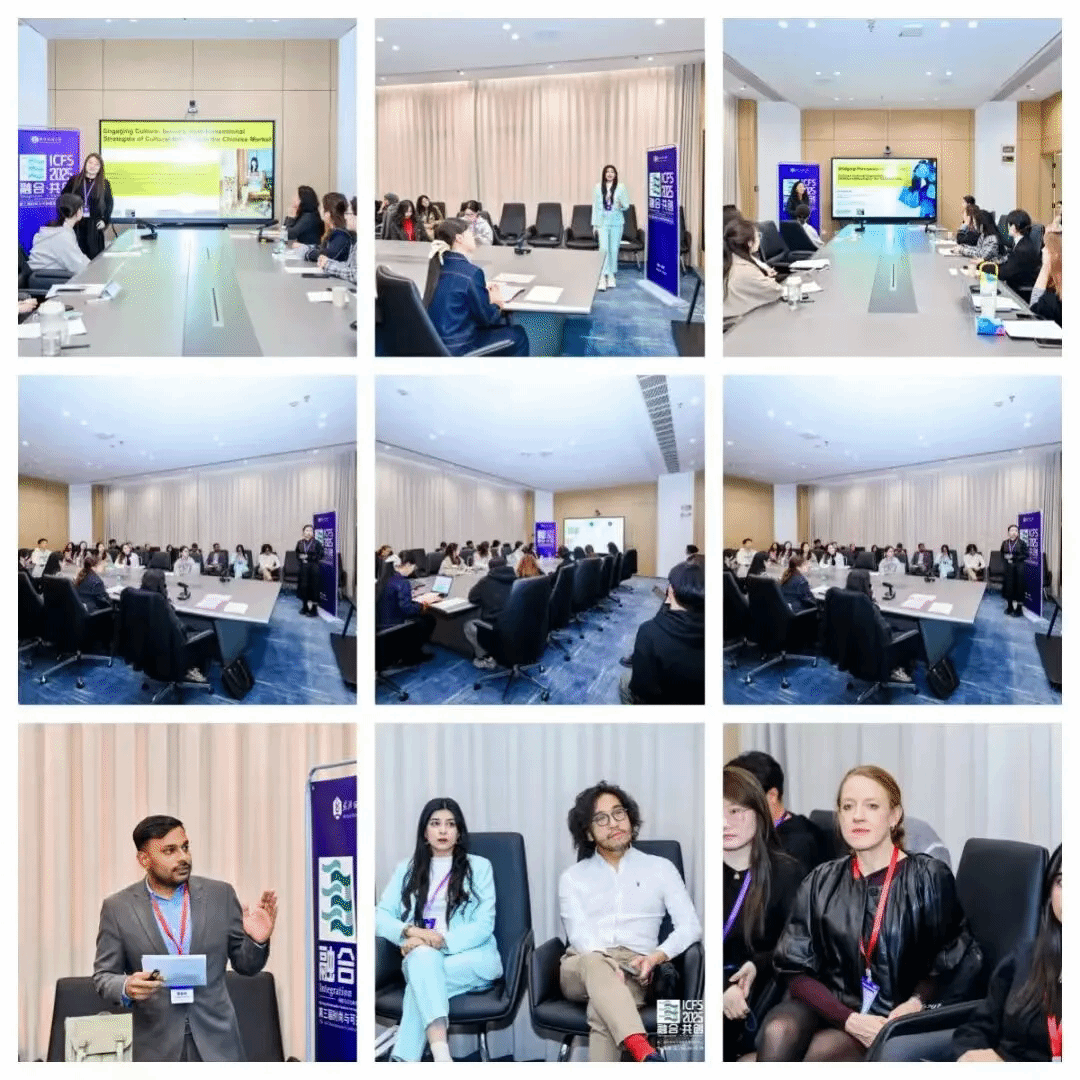
"Cultural Inheritance and Innovation" Sub-forum (Sunshine Hall)
Focused on the "modern fashion transformation of traditional elements," building a platform for cultural exchange and dialogue between China and other countries. Domestic scholars delved into the exploration of local cultural value: Anhui Vocational and Technical College systematically analyzed the evolution of the shape and system of Qing Dynasty inner robes in terms of power symbolism and identity connotations, providing historical references for the inheritance of traditional clothing; Inner Mongolia University of Technology, centered on Mongolian culture, utilized virtual museums and AIGC technology to achieve digital preservation and innovative expression of intangible cultural heritage; Wuhan Textile University integrated local intangible cultural heritage and traditional imagery such as Hubei blue dyeing and Chu astronomical star patterns into children's wear, women's wear, and eco-friendly cultural creative design, promoting the living inheritance of intangible cultural heritage and the implementation of low-carbon concepts.
International perspectives further broadened the boundaries of exchange: Manchester Metropolitan University, UK, analyzed the cultural adaptation strategies of international luxury brands in China; Chinese and Pakistani scholars jointly conducted cross-cultural reconstruction research on traditional wedding dresses and patchwork crafts, showcasing the vitality of multicultural coexistence. Attendees consensus was that cultural inheritance is the spiritual core of sustainable fashion and requires innovation as a link connecting tradition and modernity.
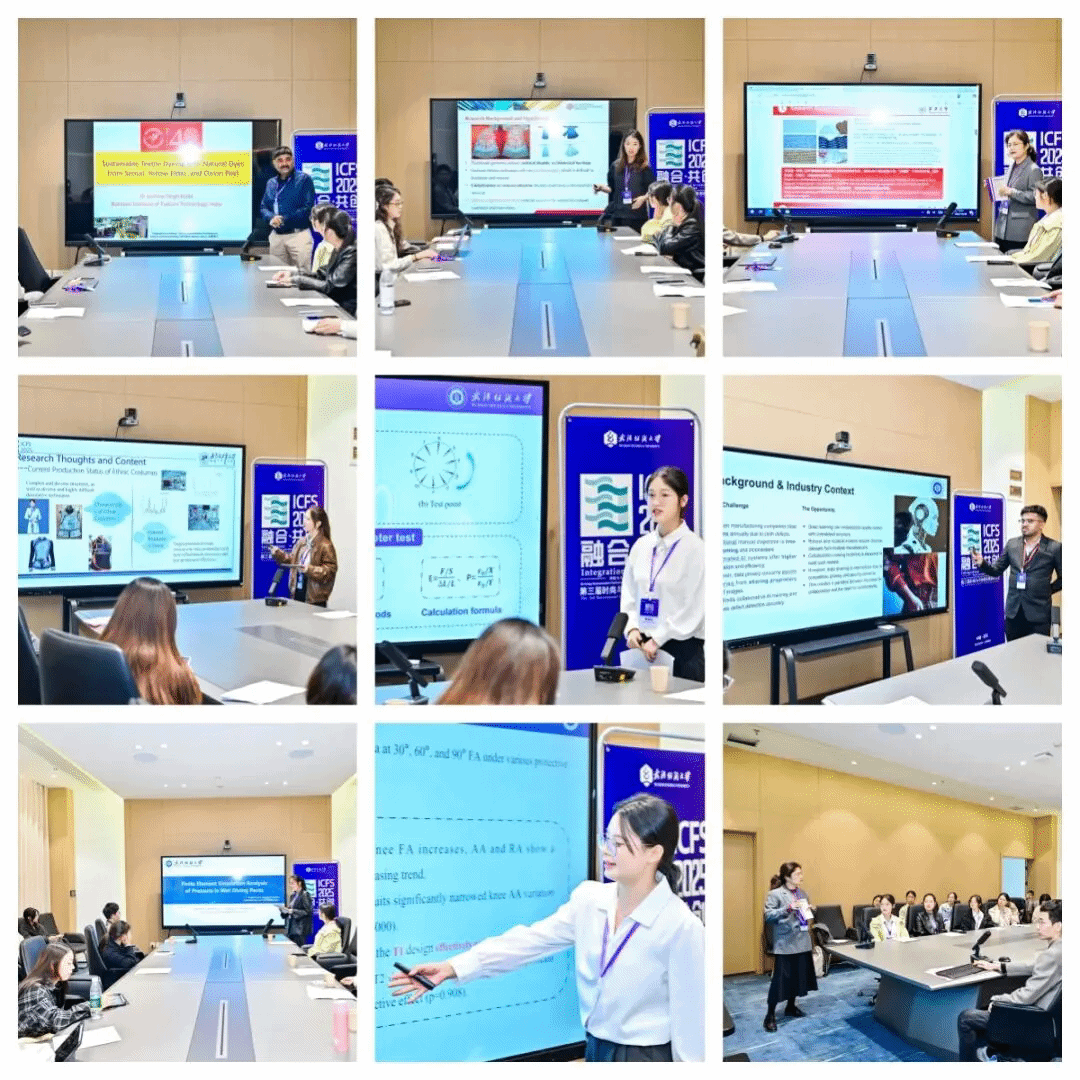
"Technological Innovation and Future Fashion" Sub-forum (South Lake Hall)
Focused on the dual drivers of "Green + Digital," exploring technological pathways for industrial transformation. International research highlighted breakthroughs in green technology: The National Institute of Fashion Technology, India, extracted natural dyes from plants like silk cotton wood and yellow bell flowers, solving the problem of textile dyeing pollution; Southeast University, Bangladesh, proposed concepts for self-cleaning and self-repairing textile technologies, providing new ideas for reducing washing energy consumption; The Hong Kong Polytechnic University, Hong Kong, China, shared experiences in digital design of intangible cultural heritage, aiding the integration of traditional crafts and modern technology. Domestic universities promoted deep coupling between technology and industry: Wuhan Textile University achieved fruitful results in areas such as virtual human simulation, AI-assisted design, and 3D dynamic capture; Donghua University, Beijing Institute of Fashion Technology, and Inner Mongolia University of Technology contributed from directions like knitted structure design, pattern visualization, and digital twin production lines, respectively, building a technological application system covering the entire industry chain. Guests pointed out that technological innovation is the core engine for the fashion industry to balance sustainability and foresight, and it is necessary to break down disciplinary barriers to accelerate the translation of achievements.
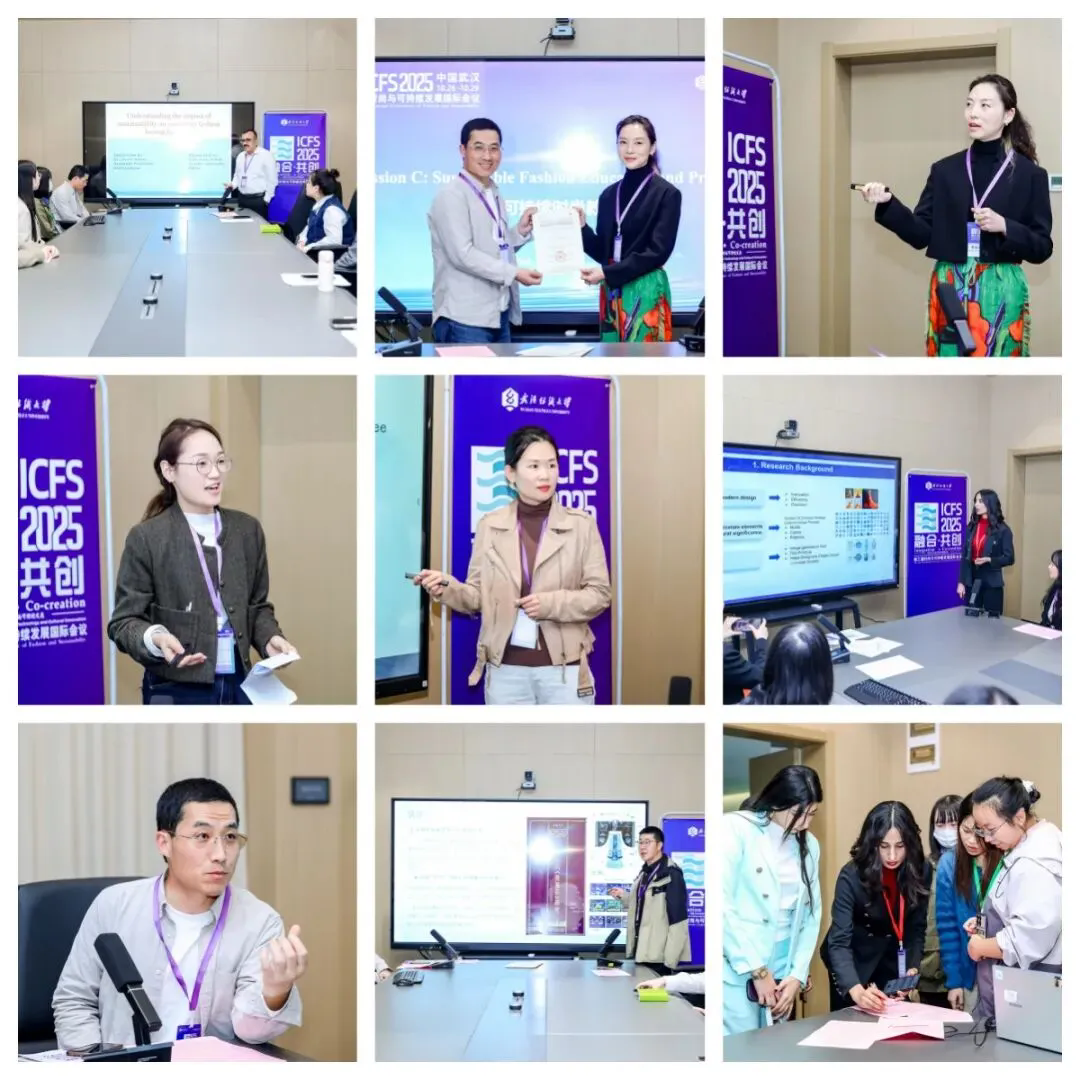
"Sustainable Fashion Education and Practice" Sub-forum (East Lake Hall)
Built a closed loop of "Education-Research-Industry-Consumption," consolidating the foundation for concept implementation. International research focused on empowering the consumption end: The National Institute of Fashion Technology, India, analyzed the impact of sustainable awareness on consumer decision-making, providing data support for market cultivation. Domestic universities highlighted the linkage between education and research: Northeast Normal University integrated intangible cultural heritage into fashion design courses, cultivating "culture + sustainability" Composite talent; Sichuan Fine Arts Institute deepened clothing structure design technology, providing implementable practical solutions; Wuhan Textile University covered areas such as innovative outdoor nursing wear, textile carbon footprint calculation, and AI design teaching, achieving precise alignment between educational research and industry needs. Industry representatives also contributed practical experience: Yantai Pacific Home Textiles proposed a green aesthetics-driven transformation path, enhancing product competitiveness through the synergy of design, materials, and craftsmanship. The forum emphasized the need to build an "Education-Research-Industry" linkage system, with talent cultivation as the core, scientific research innovation as the support, and industrial practice as the purpose, to promote the comprehensive penetration of sustainable fashion concepts.
These three parallel sub-forums, with interdisciplinary intersection and international perspectives at their core, systematically presented cutting-edge research achievements and practical innovation cases in the global sustainable fashion field through a deep academic dialogue mechanism. As a three-dimensional ecological platform for industry-academia-research collaborative innovation, they not only provided core driving force for the transformation and upgrading of the fashion industry towards green and low-carbon development, intelligent manufacturing, and cultural empowerment but also explored innovative paths and implementation paradigms of demonstrative value in the construction of an international dissemination system for excellent traditional Chinese culture and the international application and promotion of cutting-edge technological innovation achievements.
This international conference lasted for three days. In addition to the opening ceremony, keynote forum, "Belt and Road" special forum, parallel sub-forums on "Cultural Inheritance and Innovation," "Technological Innovation and Future Fashion," and "Sustainable Fashion Education and Practice," the university also held a sustainable fashion workshop, a sustainable design exhibition, a review exhibition of ten years of Sino-Japanese educational cooperation, and visits to the Textile Science and Technology Museum and National Defense Science and Technology Museum, promoting the integration of industry, academia, research, and application through diverse forms.
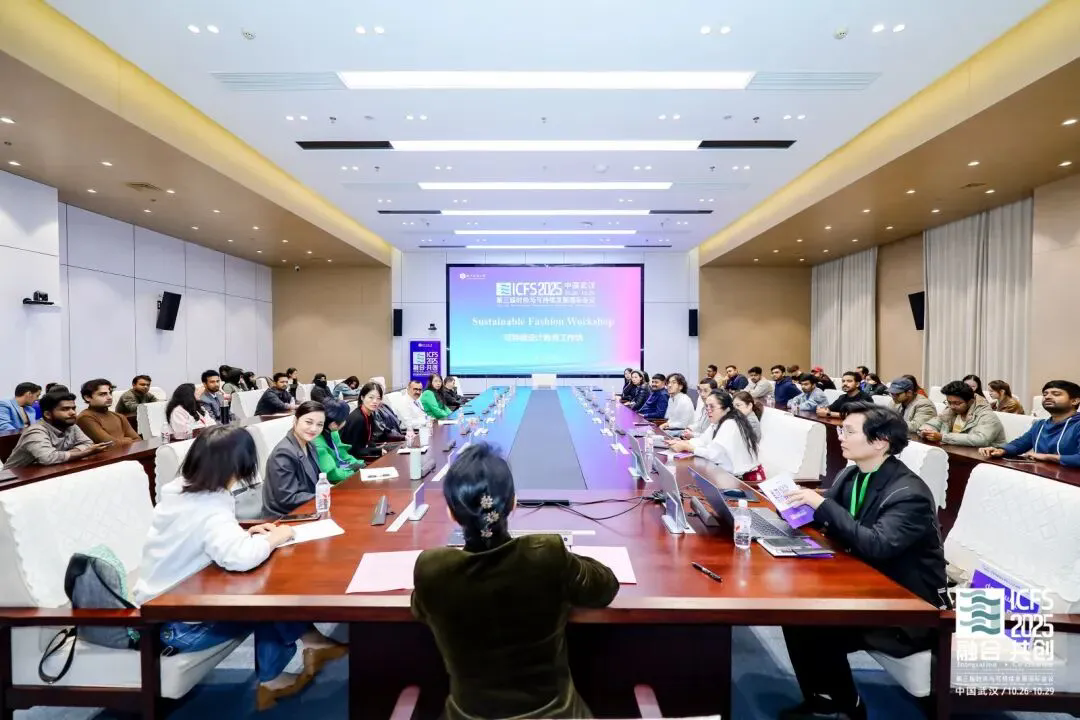
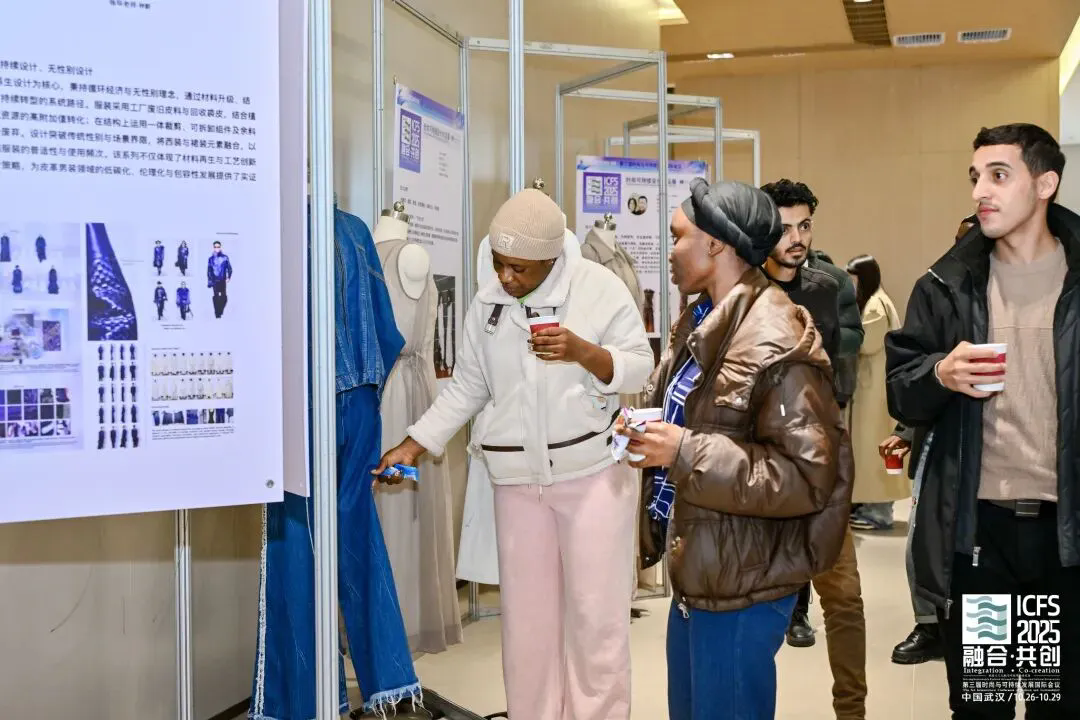
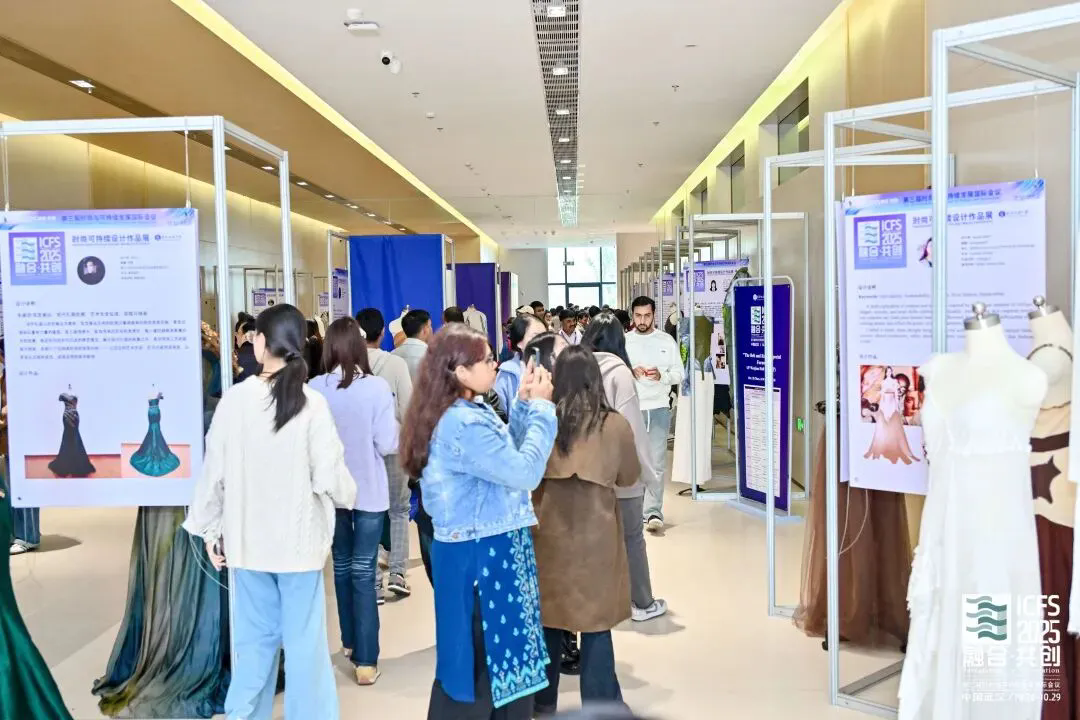
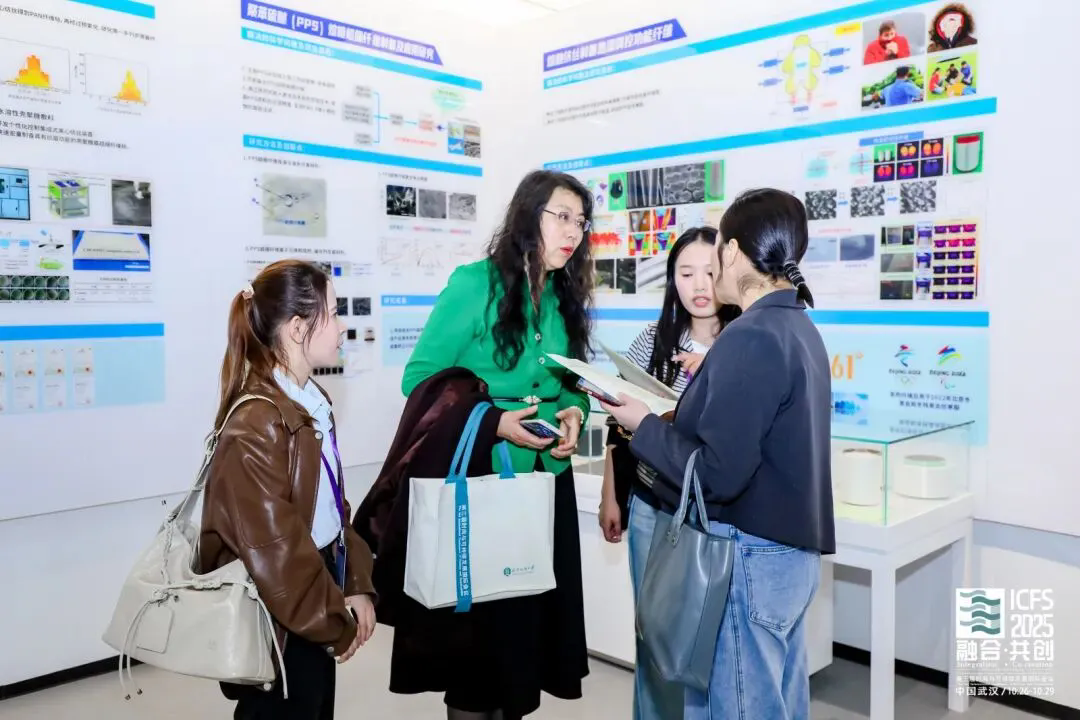
Herein are the reporting information and links from foreign media regarding this conference.
1. The Associated Press:
//apnews.com/press-release/pr-newswire/third-international-conference-on-fashion-and-sustainability-yields-significant-outcomes-ba50326fa39b709cc7aaf5b4e23156fa
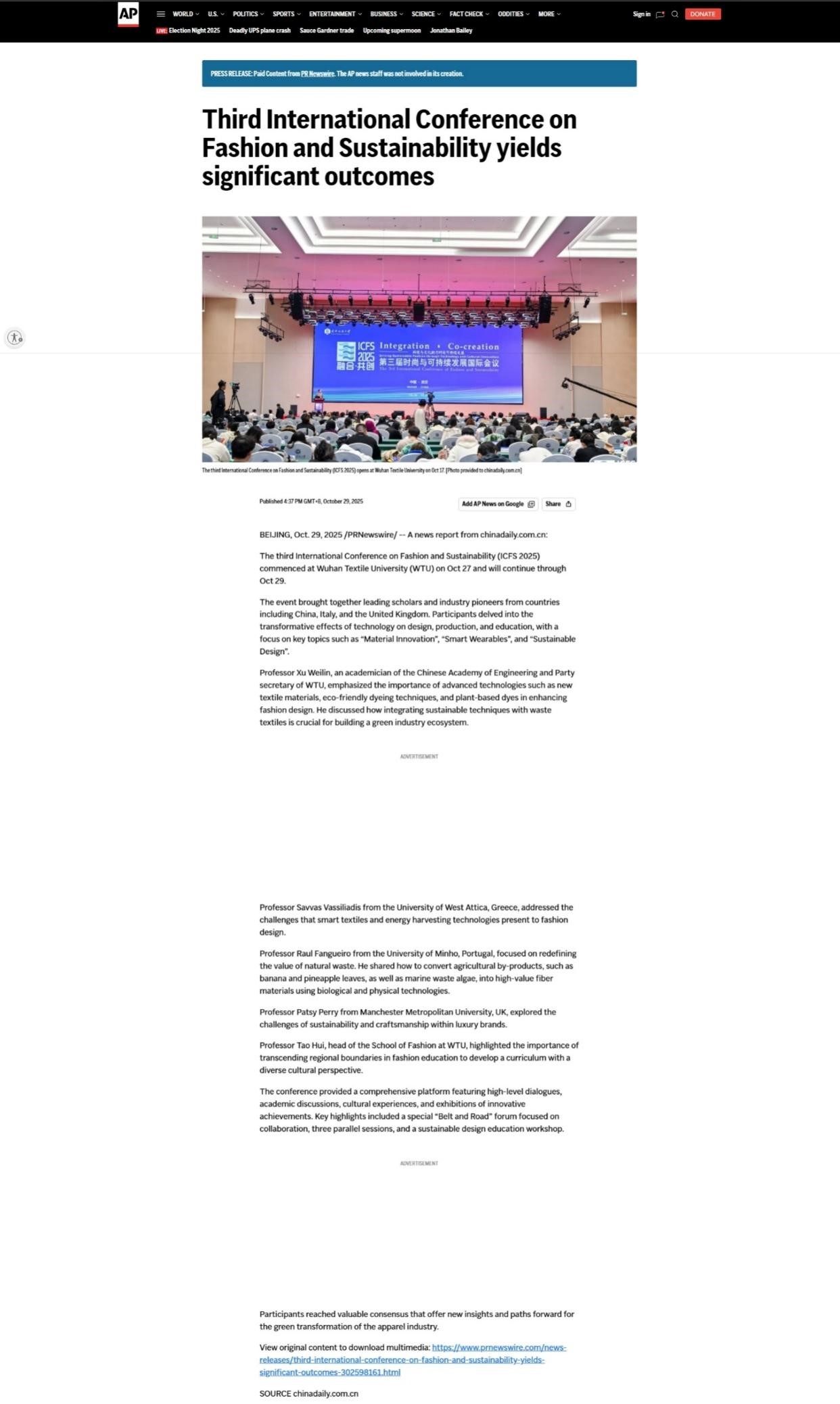
2. PR Newswire:
//www.prnewswire.com/news-releases/third-international-conference-on-fashion-and-sustainability-yields-significant-outcomes-302598161.html
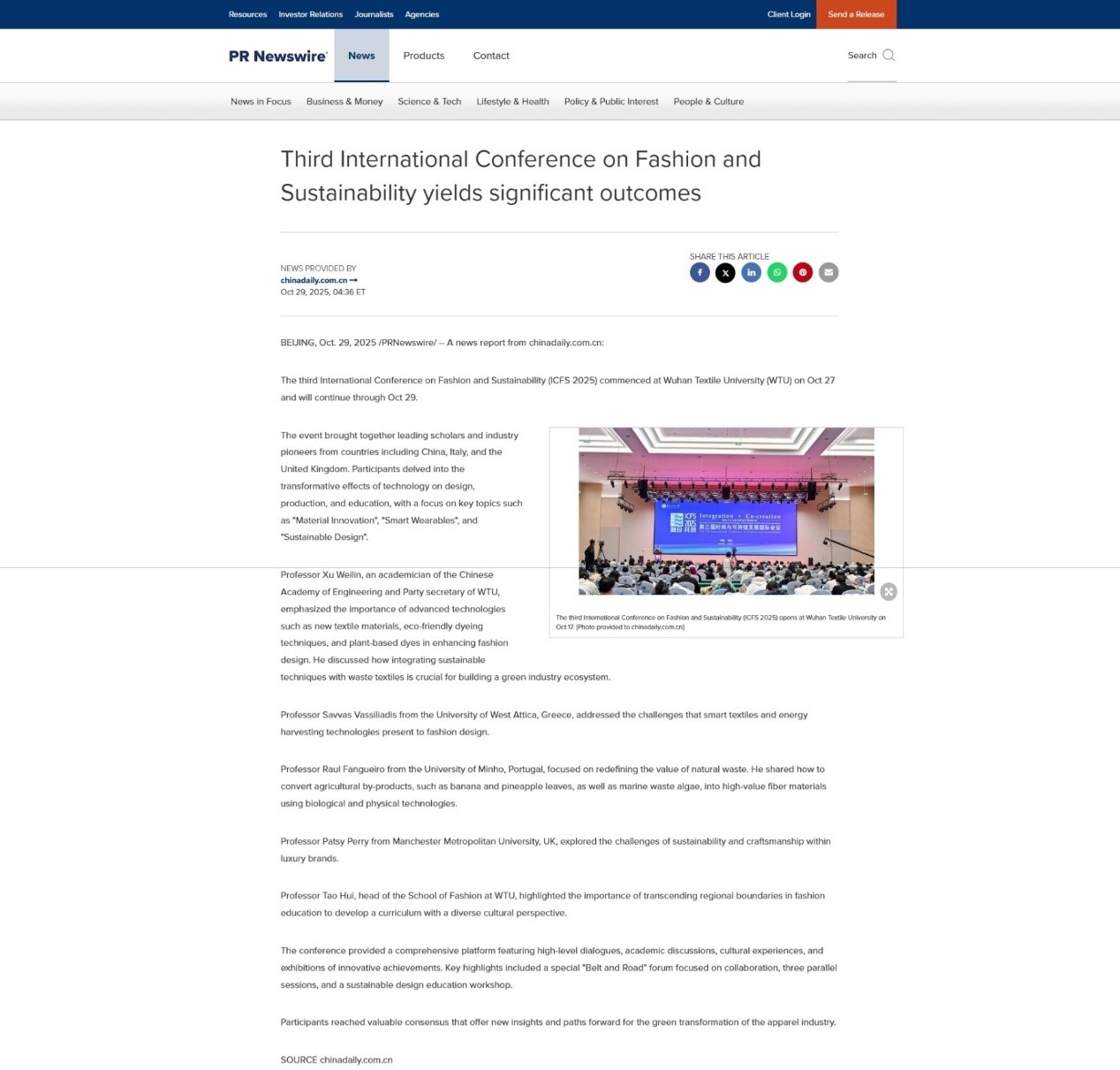
3. Yahoo Finance:
//finance.yahoo.com/news/third-international-conference-fashion-sustainability-083600244.html
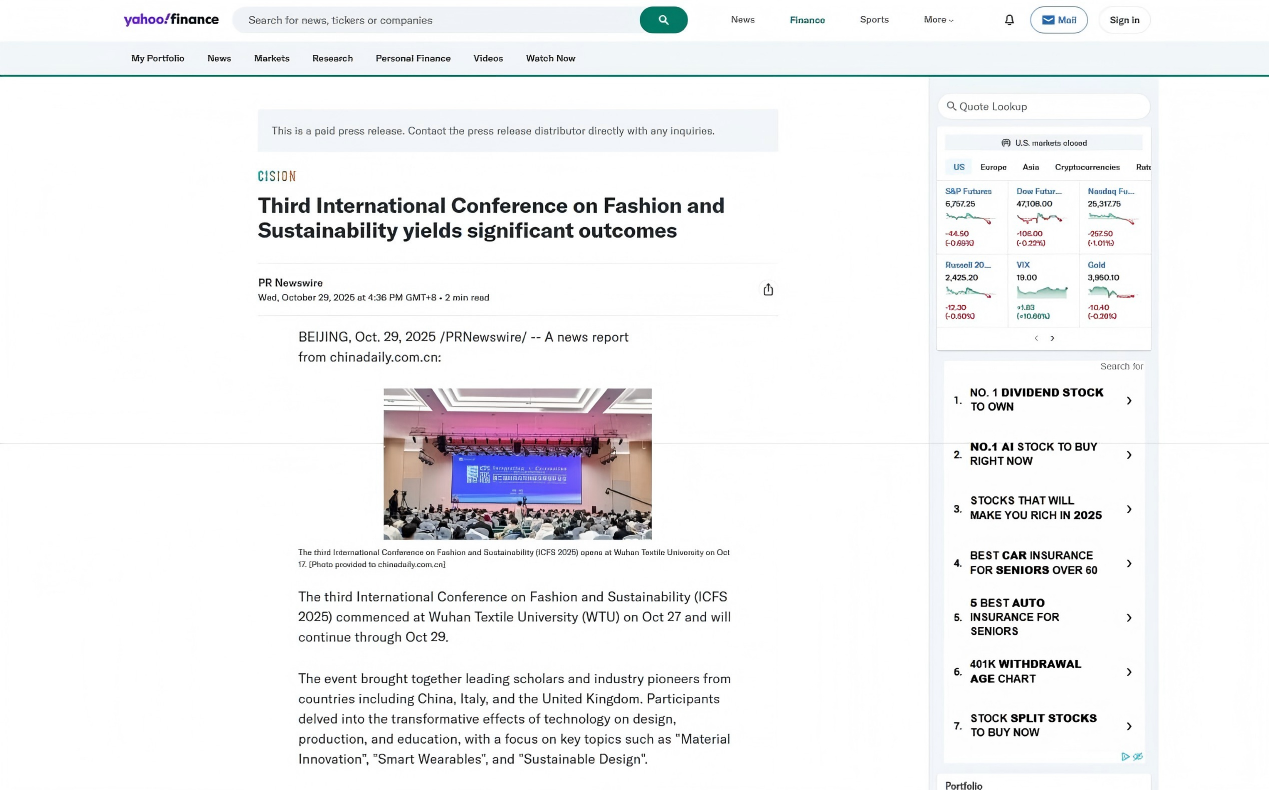
4. The Fox Broadcasting Company (FOX) in the United States:
//www.fox8.com/business/press-releases/cision/20251029CN09960/third-international-conference-on-fashion-and-sustainability-yields-significant-outcomes
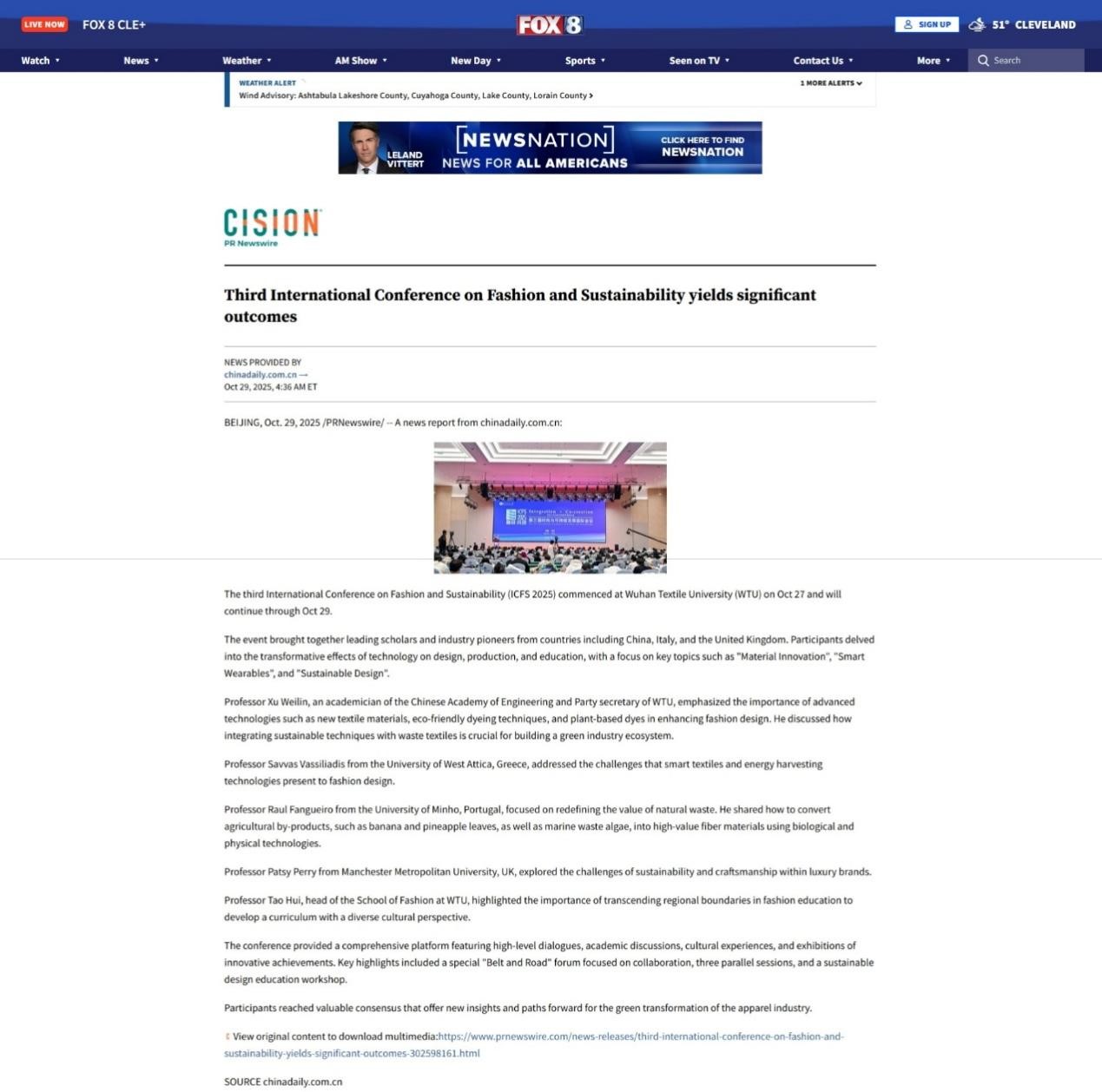
5. The American Broadcasting Company:
//www.abc4.com/business/press-releases/cision/20251029CN09960/third-international-conference-on-fashion-and-sustainability-yields-significant-outcomes
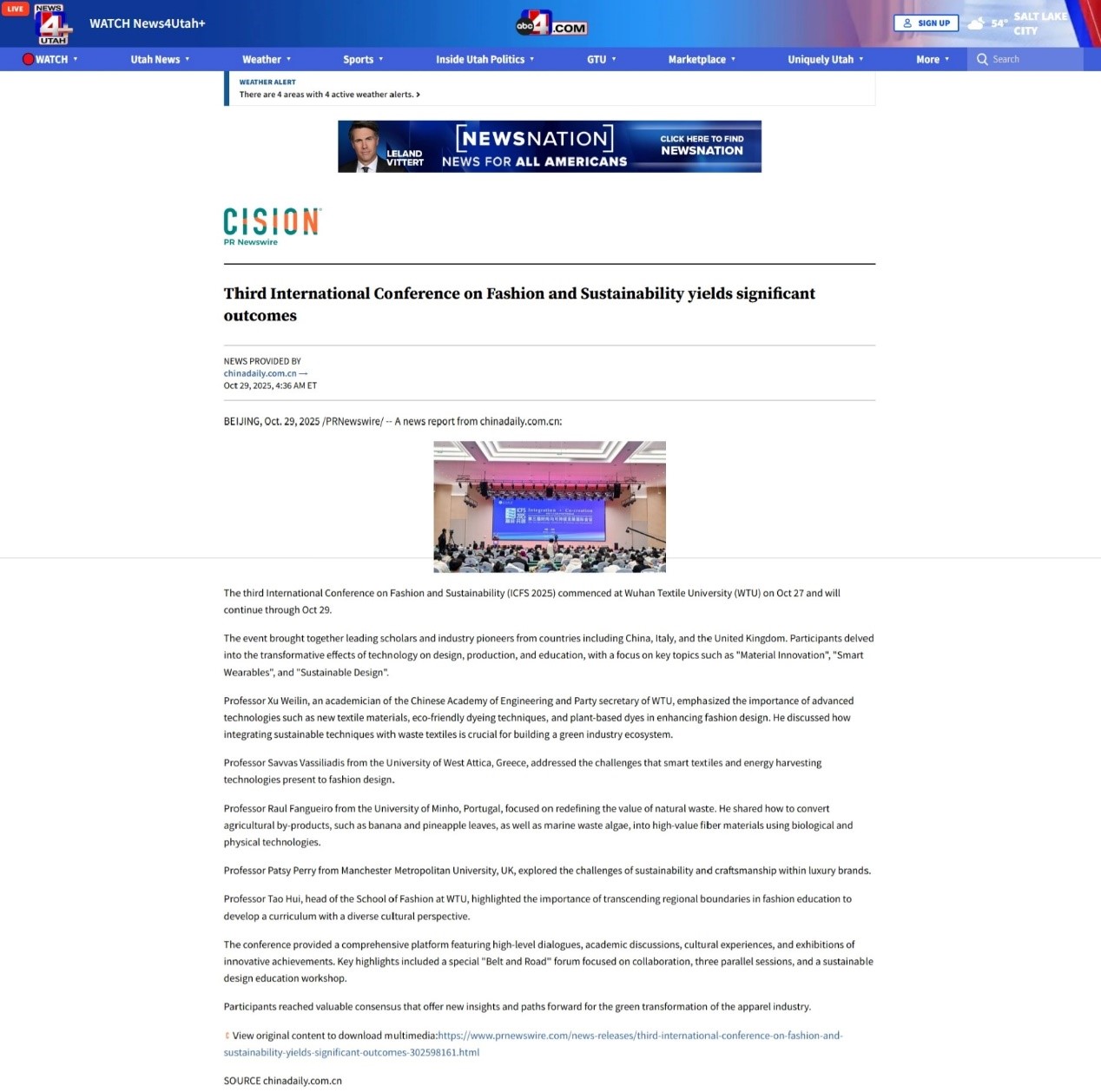
6. The National Broadcasting Company (NBC) of the United States:
//www.nbc4i.com/business/press-releases/cision/20251029CN09960/third-international-conference-on-fashion-and-sustainability-yields-significant-outcomes/
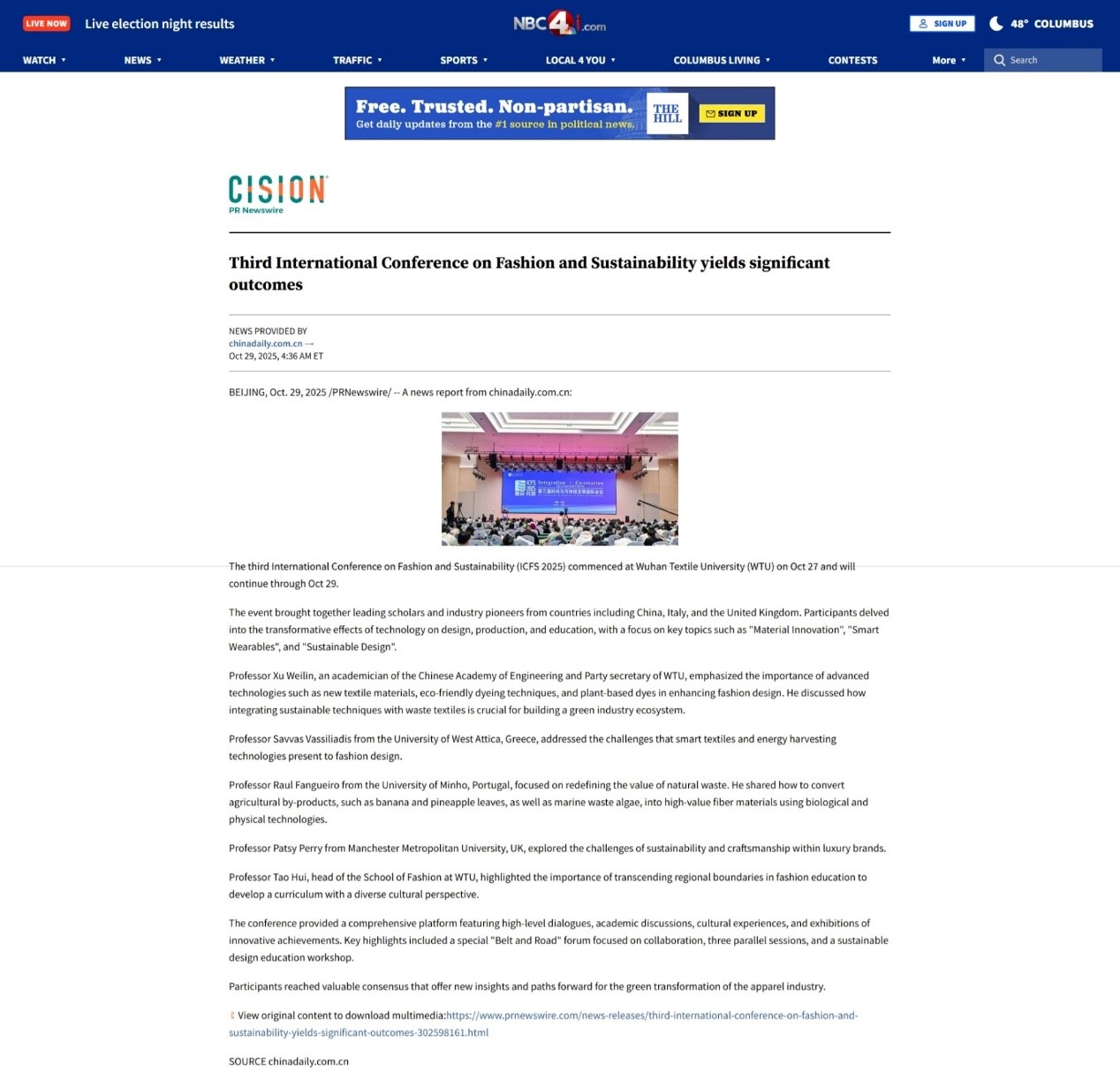
7. The Washington Daily News:
//smb.thewashingtondailynews.com/article/Third-International-Conference-on-Fashion-and-Sustainability-yields-significant-outcomes?storyId=6901d28d50e65eb6279f47e1
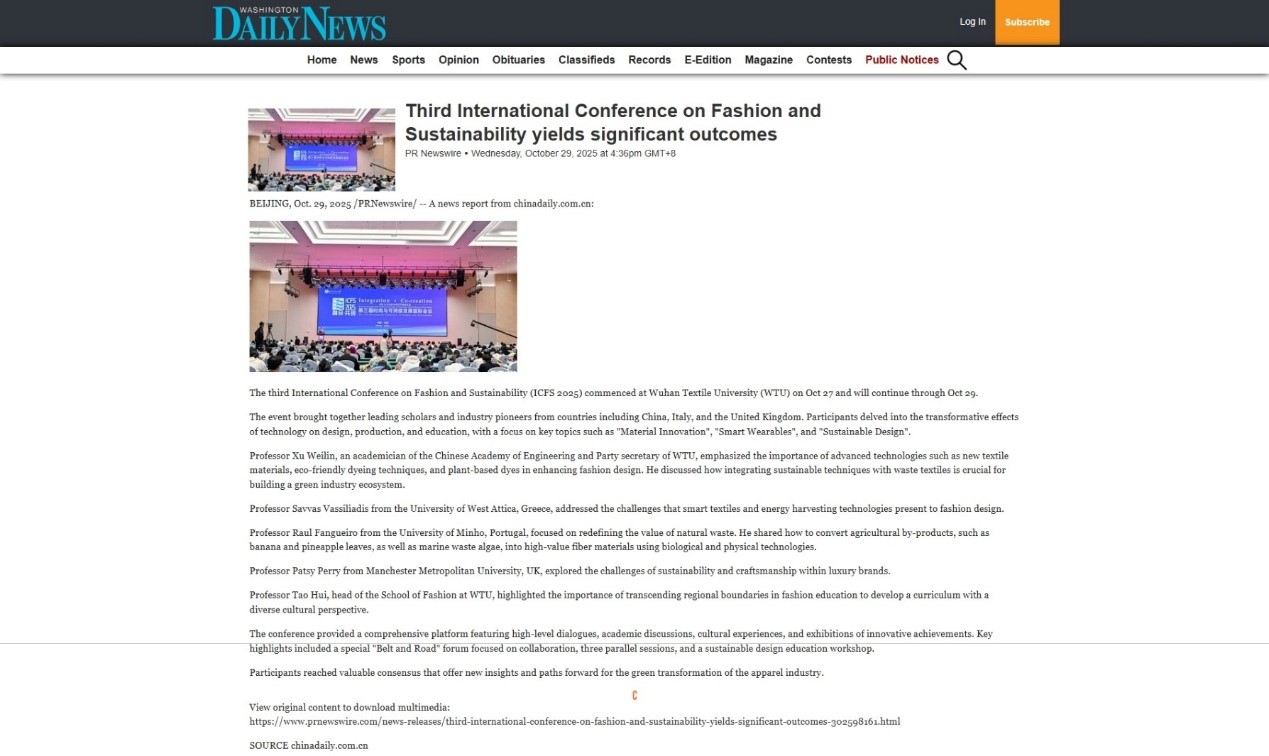
8. The newspaper industry in the United States:
//smb.americanpress.com/article/Third-International-Conference-on-Fashion-and-Sustainability-yields-significant-outcomes?storyId=6901d28d50e65eb6279f47e1
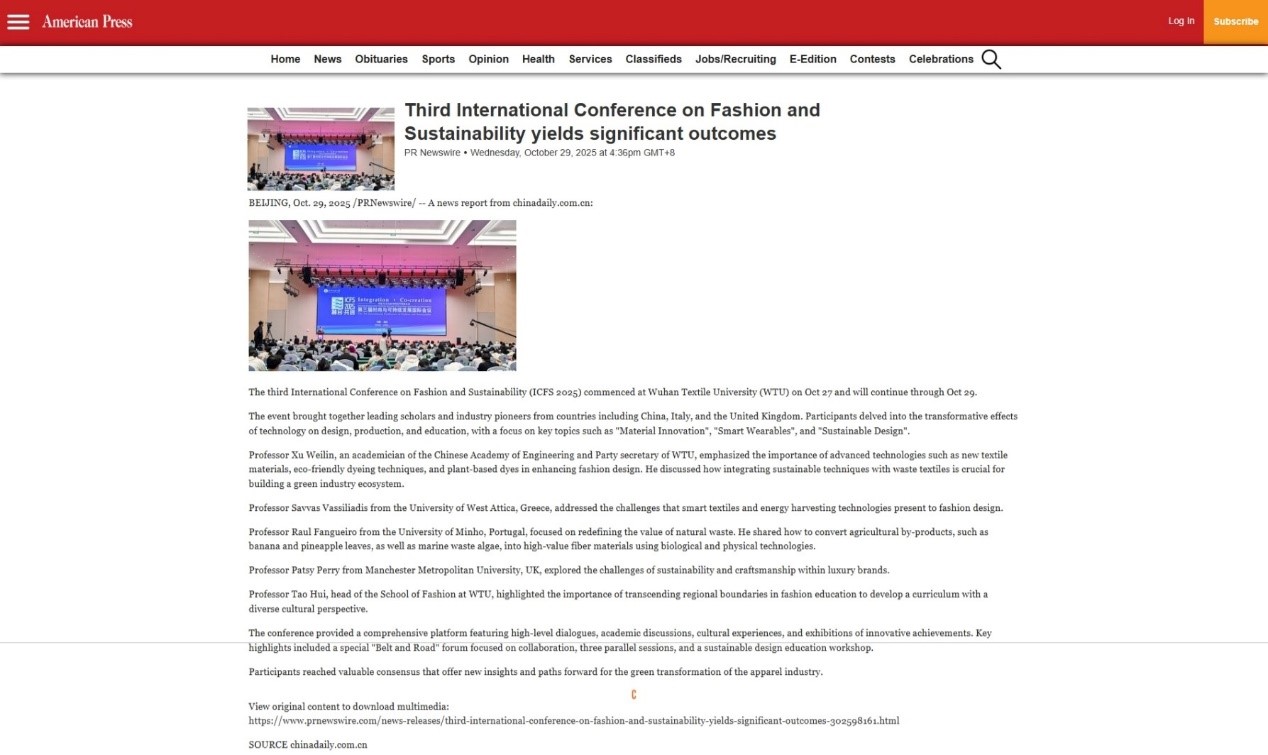
9. The Winchester Sun:
//smb.winchestersun.com/article/Third-International-Conference-on-Fashion-and-Sustainability-yields-significant-outcomes?storyId=6901d28d50e65eb6279f47e1
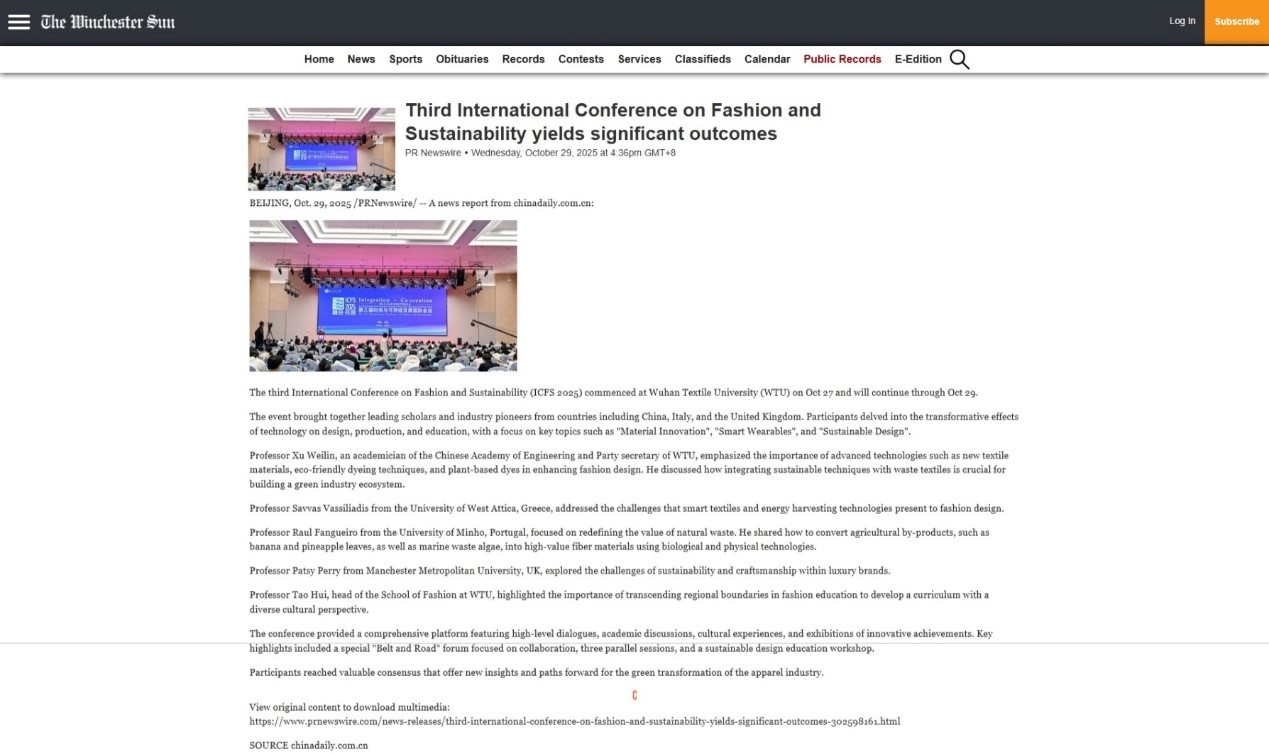
10. Morningstar.com of the United States:
//www.morningstar.com/news/pr-newswire/20251029cn09960/third-international-conference-on-fashion-and-sustainability-yields-significant-outcomes
